#the fact Jekyll was born a human and made into a monster?
Explore tagged Tumblr posts
Text
Okay so like.. Where does Jackson Jekyll become half monster? Cause like.. his mom is related to Henry Jekyll and his dad's a fire elemental. Is he half monster only because Hyde is the monster? Jackson's called a shape shifter, are we saying that his mom's side is human even though she clearly isn't? Like I get Cleo is meant to be more "normie passing" than her friends but I always figured that was Jackson's thing too but like.. more so.
That boys just a full monster, he just looks human, I'm not taking any criticisms.
#monster high#jackson jekyll#holt hyde#gen 1 monster high#i mean seriously#what about his lineage makes him half human?#the fact Jekyll was born a human and made into a monster?#because clearly in mh hes seen as a monster#monster high writers had literally no idea about Jekyll and Hyde stg
110 notes
·
View notes
Note
the vitriol for light mode is so valid. tell me about your poor little meow meow blorbo from dnd if you so wish
WAHOO
You know that TikTok audio from the Lego movie where the astronaut wants to build a space ship and he’s like “you’re not gonna tell me no” or whatever? Me rn :3 Apologies in advance for the long rant but!! You did technically ask for it hehe
ANYWAY, technically none of them are *my* poor little meow meow blorbos because I’m the Dungeon Master!! But I am genuinely obsessed with all of them
@haaawaiianshirt plays Delilah, an aasimar path of the beast barbarian. She was born and raised in a religious commune type situation before running away after being responsible for the death of a friend, and then being adopted by a sheriff in a small town. She later became his deputy, but they can’t outrun their past. The god this commune worshipped, Omen, is reaching out, and it seems he has some sort of plan for her that she does NOT want to be a part of. They’re also reflavored so that their path of the beast forms aren’t tail, claws, whatever, it’s cherub, seraphim, and throne form!! Which we got to work on together and I think it’s really cool. Emmie jokes I have shared custody of Delilah hehe, and I’ve probably done the most writing for her thus far
@suwunnysideup is playing Belladonna, a reborn tiefling grave cleric (with a bonus level in fighter!)!! They were raised from death by an evil cult called the Order of the Rotting Eye, which serves a rival god to Omen called Char’gothikon. Their past is intrinsically linked to Delilah’s, but both characters are still figuring out how. She’s recent been revealed to have more than one soul piloting their body, and are under the influence of something dark. They are currently trying to rescue their wife, Aasharni, from the clutches of the Order, who are demanding powerful Relics in return. She is also a werewolf, as of session two! They are the sweetest ever. They’re also 7 feet tall and we’re all really normal about it
@daughterofdrearburh is Nora Elliot, a rough around the edges “human” (werecoyote) ranger!! Her specific subclass has yet to be revealed in game, but she has abilities somehow related to other dimensions. A group called the Horizon Walkers, also servants of Omen, have made their connection to her known, and are seemingly trying to recruit her. She’s a terrible little beast and we all love her so dearly. She’s best friends with Morgan, and grew up in the same town as Delilah, but she can be a little aloof. She doesn’t like to trust people, and recently got shot by Morgan (under a vampiric charm) and lost the one bit of trust she had placed in anyone. Also she died and came back with black eyes but that went away so I’m sure it’s fine
@ninthhousesteel is playing Ruewen Simber, another normal human!! She’s a fighter, champion archetype, only she somehow has access to spare the dying and was able to use a scroll, despite “not being a spellcaster.” She was a socially awkward farm girl who didn’t even believe in monsters before joining the group and quickly having to confront that fact. She discovered a not at all cursed sword that was later revealed to in some way be connected to Char’gothikon. Also, she died in one session, but returned without the help of revivify—but with dark veiny scarring across her shoulder that appears to be spreading…
@candle-lion plays everyone’s favorite unethical evil lesbian, Doctor Morgan Lancaster. She’s a doctor who Jekyll and Hyde’d herself. She’s a “shifter” circle of the moon druid with a few levels in artificer. She was a doctor in a town called Dusty Springs, which was terrorized by vampires from a coven called the Onyx Eye Coven for many years. She has a HUGE vendetta against vampires, and is damn determined to exterminate every single one she sees. In an effort to become stronger and protect people, she made an experimental serum, which turned her into a monster. During times of stress, at will, or occasionally at random, she transforms into a “bad taxidermy wolf monster” but apparently mostly maintains control. She’s looking for a cure for herself, and recently discovered she too is somehow connected to Char’gothikon.
@lavenderlevetan is a petty vampire and we fucking love her. Seraphina is a half elf now vampire and she’s a fighter as well!! She has canonically killed 1000+ people over 20 years of being a vampire!! But she specifically chooses to go after bounties, and specifically those that list “wanted dead or alive.” She’s actually the nicest person ever until you (Morgan) give her a reason to be petty. She’s also the most charming of the group and her expertise in persuasion has made her mvp of multiple sessions. She was dragged into this mess while trying to find a missing person for a bounty, and thus far has yet to discover why her specifically, when it seems every other character is here for a Reason
Morgan and Seraphina hate each other and they want to kiss about it so bad. When any of us post about morphine, that’s them LMAO. Deliladonna is obviously Delilah and Belladonna. Norue are the slowest slow burn ever
And while I’m the DM and don’t have a PC, I do have a special little guy NPC that I’m a little obsessed with. Her name is Brozi and she’s a half orc way of mercy monk. She was Delilah’s best friend (and for some time, girlfriend) after the aasimar arrived in Sawtooth City and together they were the worst teenagers ever. Brozi isn’t going with the party, but she and Delilah are still very close, and their goodbye will be hard. While Delilah is gone, they get to achieve their lifelong dream of opening a bakery 🫶
In any case. Cowboy dykes. With horror. Themes of free will, losing control, found family, and learning to trust and overcome prejudice. The friendship dynamics took everyone by surprise. Belladonna and Seraphina are undead besties. Ruewen and Seraphina play go fish. Delilah and Morgan are slowly fixing each other. Nora and Morgan are also fixing each other. Morgan is super protective of Ruewen and it’s very sweet. I would die for any one of them. I’m obsessed with them a healthy amount.
This is the party 🫶
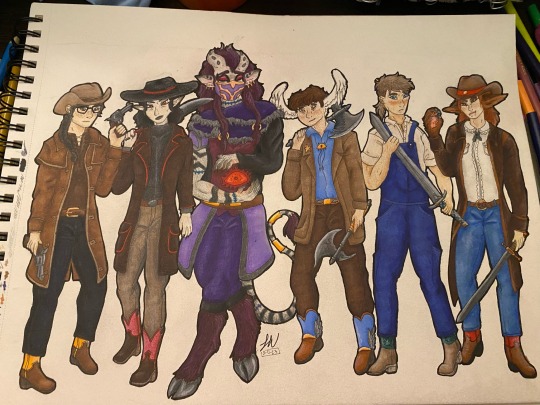
(In order left to right: Morgan, Seraphina, Belladonna, Delilah, Ruewen, Nora)
#hope you silly goobers don’t mind the tags#anyway I’m sure these guys wouldn’t mind being asked about their little guys#they’re all so fucking cool#I mean this about the players just as much as the characters#I love you guys#it’s after midnight so I’m sappy sue me#thank you so much for the chance to rant anon 🫶🫶🫶#memento mori campaign
15 notes
·
View notes
Text
SANDERS SIDES KARAOKE: GOTHIC LITERATURE MUSICALS EDITION
Okay, so after four years of being in the Sanders Sides fandom, I’m going to attempt to write some headcanons. Here we go.
Since it’s well-known in fanon that the sides do have karaoke sessions, imagine what would happen if they sang musicals based on gothic literature.
Roman’s happy because broadway, duh, Logan is happy because it’s canon that he enjoys gothic literature since he dressed up as Frankenstein’s monster for Halloween, same reason for Virgil and Patton’s happy that his family is bonding. He made extra cookies for the occasion. He’s dangerous like that.
(I headcanon that when Thomas had to write analyses of gothic literature novels for school, Virgil, Roman and Logan would work together to come up with stuff and write the best essays in class and Patton would be so proud of them)
I’m not going to count Les Mis because I’m not too sure if that counts as gothic literature and whilst the Hunchback of Notre Dame is indeed gothic (trust me I read that in a plane once. An entire, like, ten pages is dedicated to describing the scenery) I don’t think it became a broadway show.
Now this isn’t like their usual karaoke nights, no sir. Just idly remaining in the living room won’t do. Where is the gusto? The pizazz? The accolade winning extravaganza? The-
“We get it Princey, can you just get on with it?” - Virgil
No, this type of singing can only be accompanied with an atmosphere that will do it justice. To the imagination they go and with Logan’s (who has practically memorised every single one of these books and is not geeking out at all) input on how the novels describe each setting, Roman creates very intricate landscapes for each song.
When they sing ‘Alive’ from ‘Jekyll and Hyde’ Roman thought that it would be really cool for Patton to play Mr Edward Hyde since Hyde is literally the human id and Patton, being the embodiment of morality, is literally the superego (although to be fair, Patton is also shown to be quite childish and impulsive since he’s also the base of Thomas’ emotions and Hyde is impulsive because he’s a way for Jekyll to act on his own emotions - especially since the only crime that Hyde does in the book are him over-reacting with his anger by beating a man to death. And in the novella, Jekyll writes that he and Hyde are like father and son and that Hyde is actually younger than Jekyll is, he does have that sense of childishness that Patton has only instead of that childishness being good and helpful, it’s bad and hurtful. Plus in the soundtrack of Alive, whilst Anthony Warlow does sing about how good being evil feels like, he also sounds like he is crying tears of joy of being able to be himself, the first words post-transformation being freedom and anyways these are supposed to be fun headcanons not analytical headcanons so I digress…)
Anyways Patton is happy to play the villain because “look kiddos, Roman conjured up this really swell cape” “the correct term is cloak” “and check out this top hat and cane!” and he’s just belting out the words and froliking around Victorian London without a care in the world, making his cape swoosh in the wind.
“Patton I would advise you not to take your shoes off. This is nineteenth-century London with people dying of cholera by the dozens, your feet could catch a myriad of infections.”
“Worry not, specs, the scenery is merely an illusion. I would never allow for our dear padre to succumb to the villain of illness”
“Aww, thanks kiddo (cue Patton’s sunshine smile) now where was I? IT’S THE FEELING OF BEING ALIVE! FILLED WITH EVIL AND TRULY ALIVE!”
They have Logan sing ‘I Need To Know’ because a doctor of science singing about wanting to expand his knowledge and having that thirst to do whatever it takes to get said knowledge. That is a Logan Sanders song right there. At first he’s like “why do I have to sing. I was happy enough giving directions and helping you with the scenery” but Roman creates this big scientific library that could rival the one from Beauty and the Beast/ laboratory from that’s practically the identical to Jekyll’s lab in the book and he’s like “Fine” like he isn’t enjoying himself. He is. They all know it. He’s not fooling anyone
Patton and Roman sing ‘Bring on the men’ together (yes, whilst wearing dresses) whilst Virgil and Logan drink apple juice from those big british beer glasses in the mind-scape created Red Rat (which Logan is quick to point out doesn’t exist and is vocally upset at how the musical adaptation added unnecessary romantic subplots with Lisa and Lucy when the book itself only had three background female characters who were only there for like one paragraph. He’s even more upset at the other inaccuracies with the book like how in the play Jekyll creates his formula as a cure for mental illness and Hyde was accidental whilst in the book he did it because he wanted to indulge in sin without fearing the consequences and Hyde, whilst not being exactly what he wanted, was actually created on purpose or how in the book Hyde only kills one man and in the musical he kills practically everyone except for the one person he did kill. Virgil pats him on the back with sympathy). Roman and Virgil are sniggering at the sexual euphemisms at the end of the song whilst Patton’s confused. She just seems really enthusiastic about food.
Roman sings both parts of ‘Confrontation’ by himself. He gets a standing ovation.
He also does ‘Transformation’. The problem is that he was so good at sounding like he was in complete agony and near death that they had to stop the song prematurely because Patton was getting upset. Don’t worry, Pat gets lots of cuddles by Roman afterwords.
(You know what I might do some sides reacting to The Strange Case of Dr Jekyll and Mr Hyde later because 1. It’s my favourite book and 2. All four of them would have very interesting takes on it)
From the Frankenstein musical Virgil plays the criminal from ‘Say Amen’ because he wants to (seriously, the guy’s first words in the song are ‘I curse the day that I was born into a world so black with hate’) and Logan plays Victor Frankenstein but Patton refuses for his son to even pretend to be executed by the noose so they have Roman play a man wearing a british executioner outfit with a foam sword and the creative side just bonks the anxious side on the neck with it. Logan despairs about the historical inaccuracy from his place in the stands whilst Patton is cheering next to him. Patton also hands him an extra jumper to keep him warm in the Switzerland cold.
“Patton, I am grateful that you are thinking of my health but no one in eighteenth century Switzerland wore bright blue jumpers with cartoon kittens on them”
“Really, Logan, are you paw-sitive?”
“I would like to change places with Virgil. Immediately”
Roman and Logan turn ‘Birth to my creation’ into a duet because Logan enjoys the scientific aspect of it and Roman can’t resist the drama (of course). He goes all out. He makes Victor’s lab perfect to the smallest detail (and cheers when Logan’s eyes start lighting up and he does that cute clappy thing when he’s excited), he conjures a storm and makes lightning strike at the best moments of the song. He even creates a ‘wretch’ (what Victor calls the monster in the book. I’ve heard that it’s name is Adam but all I remember from the novel is Victor calling himself god and the creature his Adam) to lie on the table.
“And we didn’t even have to go grave-robbing for it. Or drop out of University.” - Roman
“No matter how many times I wanted to.” - Virgil
Roman and Virgil do most of the songs from Dracula. The creative side creates this huge, expensive-looking window-balcony thing with glass double doors and billowing silk curtains so that he could dramatically sing ‘the longer I live’ whilst the wind blows through his hair and he dramatically drapes himself on the balustrade so that the light from the full moon hits his figure just right. Patton’s close to crying.
Logan is very eager to give as many facts as he can about nineteenth-century mental institutions for ‘The Master’s Song’. He gets really into the history behind certain treatments and different cases. Roman plays Renfield and the others play doctors.
Virgil is super into Dracula’s castle during ‘Life after life’. He and Roman duet that song wearing all-black. Logan tries to help Patton’s slight fear by telling him the history behind different pieces of architecture.
Patton plays Christine during Phantom of the Opera
Roman, Virgil and Logan sing ‘A story told’ from The Count of Monte Cristo around a circular table in a dimly lit tavern. Patton takes pictures and drinks hot chocolate in the sidelines.
#sanders sides#sanders sides headcanon#logan sanders#patton sanders#virgil sanders#roman sanders#lamp#calm#lamp/calm
29 notes
·
View notes
Text
Toga Himiko’s Normal Life
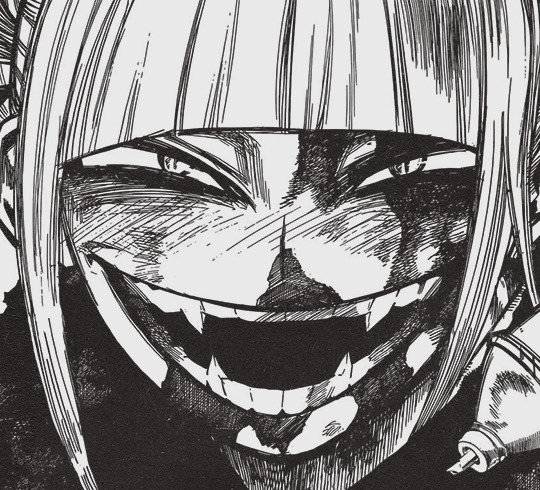
Himiko looks like the most straight forward case of what pop culutre considers to be a classical sociopath / psychopath in My Hero Acadmia. Shigaraki, Dabi, Hawks were all groomed to become the way they were, but Himiko possessed a natural inclination towards blood and violence from the start. She seesm to be a natural born cold blooded killer, however in this meta I’ll argue that while Toga seems like the flip-side of a normal, good person like Uraraka, she’s actually just a normal girl herself.
1. Character Origins
Volume sixteen of My Hero Academia had an official illustration included as an extra that shows the characters Twice and Himiko drawn together in an illusion to a famous Joker and Harley Quinn illustration.
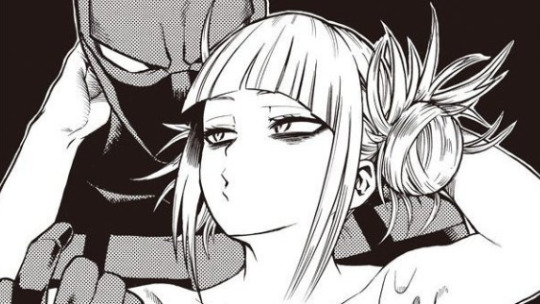
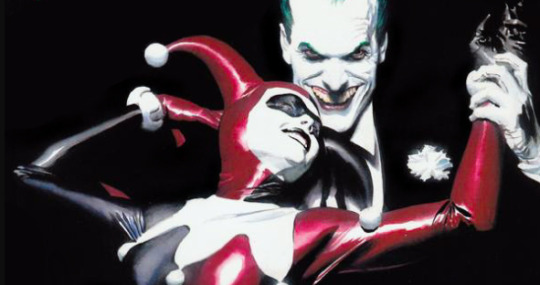
Now, I’m not going so far as to claim Himiko was based off of Harley Quinn, but one the league of villains and characters like Twice (and ReDestro) have made similiar references to the Joker before that especially with the quote “All it takes is one bad day”. There’s also enough similarities betweeen the two characters, they’re both the only female members of a crime syndicate that is mostly men, and dominated by men. Their backstories mirror each other, they were both relatively sane, normal, girls, until suddenly they cracked one day and became a total inversion of their previous presonality. There are enough similarities that I could use Harley as an example to explain a few of the important ideas present in Toga’s character.
They are also both female characters who are written with love as the central concept of their characters. Harley’s origin as originally depicted in the comic and episode for the Batman the Animated Series “Mad Love” goes as follows: Harleen Quinzell was a psychiatrist working at Arkham. Eventualy she came to sympathize with one of her patients which triggered a transformation in her from well meaning doctor, to love-sick sycophant of the joker who broke him out of prison.
A lot of Batman Villains have origins like this. The most comparable one is Harvey Dent. Proescutors, Doctors, we are told the people who hold these jobs are good and righteous people. Even Harley herself started out as someone who just sympathized with a patient too much. However, somehow they become flipped into the exact opposite versions of themselves. They go mad for lack of a better words. Harvey Dent who was once a symbol of justice, becomes nothing more than a murderer, and Harley Quinn goes from healer to the sidekick of a mad clown willing to destroy everything in the name of love.
The question, asked in both Himiko and Harley’s stories is how can good people flip like this?
Most people have a black and white view of these issues: good people are only capable of good actions, and bad people are capable of bad actions. It’s hard to swallow the fact that any normal person has the capacity to cause so much harm inside of them.
We see similiar remarks in the background of Himiko’s story. Himiko comes from a good upper class family, she went to what was most likely a good school, she was always smiling and surrounded by friends. Everyone who comments on her sudden transformation reacts in a similiar way. “She was aways so cheerful and well-behaved, I still find it hard to believe.” She was always such a good girl, and good people don’t do those things.

Normal people, good people, don’t have the capacity to do bad. That’s what makes the transformations so shocking. Therapists/Doctors are supposed to heal, Prosecutors are supposed to be just. And now we return to our old friend Jung.
The story of Harleen Quinzell and Harley Quinn. The story of Himiko Toga the happy middle school girl and Himiko Toga the serial killer is a tale told over and over again, it’s just usually told with male protagonists instead of female ones. It’s Dr. Jekyll and Mr. Hyde.
Robert Louis Stevenson’s The Strange Case of Dr Jekyll and Mr Hyde (1886) is a late-Victorian variation on ideas first raised in Mary Shelley’s Frankenstein (1818). Stevenson’s monster, however, is not artificially created from stitched-together body parts, but rather emerges fully formed from the dark side of the human personality. In the story Dr Jekyll, an admired member of the professional Victorian middle-classes, conducts a series of scientific experiments which unleash from his own psyche the ‘bestial’ and ‘ape-like’ Mr Hyde (ch. 10). Gothic fiction had examined the idea of the sinister alter ego or double before on many occasions but Stevenson’s genius with Jekyll and Hyde was to show the dual nature not only of one man but also of society in general.
“Man is not one, but truly two.”
Robert Louis Stevenson
Both cases are tales are transformation, of the monster coming from within. Himiko transforms from middle school girl into serial killer. Harleen Quinzell transforms into Harley Quinn. Dr. Jekyll becomes Mr. Hyde. We witness a transformation into a monster that seems the antithesis of everything that person was boefre, but was inside of them all along this works because of the jungian idea of the shadow.
The shadow is the unconscious side of personality. The shadow is what exists but what we do not acknowledge. If our behavior during everyday life, choosing to smile, choosing to talk to people, choosing to use our manners is a mask then the shadow is the face beyond the mask. The conscious personality conceals, the shadow reveals. It’s the difference betewen who we are and who we choose to be. The shadow isn’t necessarily negative however. The shadow is just the repressed side of our personalities, it’s what we try to hide.
The shadow plays a role in Harleen’s transformation. While it’s present in Mad Love as well, a recent miniseries ‘Harleen’ really dives into the Jungian symbolism. There’s even several similarities in common with Himiko’s story, for example there’s a scene where Harleen is shown watching the bat man beat up joker and notice how everyone is cheering despite the fact that it’s violent.


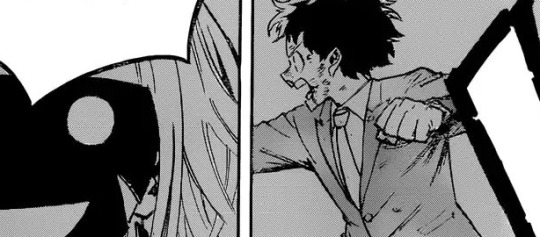
Himiko’s interest in a boy is sparked by watching him get into a fight while everybody else is cheering for him.
The cover page depicts the change between Quinn and Quinnzel as a crumbling mask, which is the exact same imagery used for Himiko.
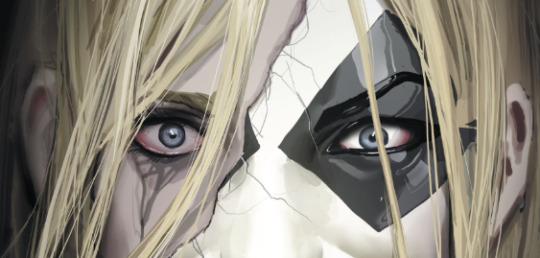

When she enters Arkham she chooses to depict Harley Quinn’s silhouette in Harleen’s shadow. Once again implying that the transformation is not so sudden and jarring as it seems, that Harley Quinn has always been there and is a part of her psychology the same way Mr. Hyde is inside Dr. Jekyll.
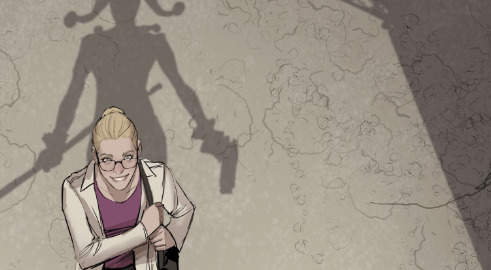
The comic even points it out. Harleen, and also by extension Harvey Dent are people who claim to be “good, righteous people’ and yet both of them end up transforming into murderers. Two-face’s name is literally two-face.

There’s also one particularly Jungian sequence in the middle of the conflict. She dreams (dreams are unconscious and therefore the realm of the shadow in Jung’s theories) about the city of gotham as a place inhabited with citizens who are monsters wearing the faces of human beings.
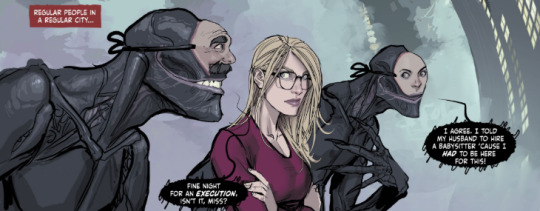
The idea is consistent throughout that Harleen is not really a ‘good person’ she’s merely repressed. She has had this capacity to be violent inside of her, this selfishness, all of these dark desires carried with her all along but rather than deal with them in any healthy way she repressed them until repressing them is no longer an option. Harvey Dent’s face gets half burned off, Harley’s skinn gets bleached by chemicals, the monsterous features inside of them are now worn on their faces and they have to wear their ugliness on the outside rather than the inside. They are now expressing every single thing they have repressed. However, the suggestion in both stories is that these are not special cases, that Gotham is such a repressed society that everyone is repressing the things they don’t like about themselves in that way. Harley fell in mad love sure, but love was just the reason, just the trigger, the truth is those feelings always lurked inside of her and she had no healthy way of dealing with them before that point.
That is the shadow, it’s everything you repress but it never disappears. If you ignore it, it takes on a life of its own. In some cases, like Harley’s you basically become your own shadow. Harley is the flipped upside down version of Harleen Quinzel, now her inner demons are what are expressed on the surface (desperation to be loved, violence, etc.) while her ‘normal’ self is hidden under a mask of insanity. That’s in fact how she ends the comic, Harley qalking around while Harley is trapped on the other side of the mirror because they have basically traded places. Now Mr. Hyde is walking around, while Dr. Jekyll is hidden personality. But it’s important to remember it’s not something like a split personality, Harleen Quinzell and Harley Quinn were always two sides of the same person. Even when she starts expressing her ‘bad’ traits, the good traits don’t go away. They’re just hidden underneath the surface the way the repressed bad traits used to be. Because you’re not good or bad, you’re not one side or the other. You’re both at the same time. Man is not one, but truly two.
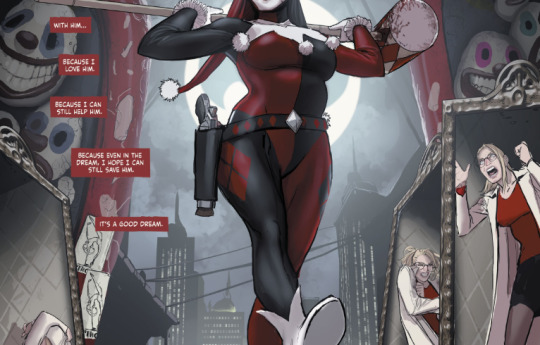
So the complexity in Himiko comes from understanding that she’s BOTH a normal girl, and also a blood crazy yandere psycho.
2. A Normal Girl - Uraraka Ochaco
Uraraka is a pretty standard shonen heroine. She’s a cheerful girl. She’s a supportive friend. She’s the embodiment of what you’d call a good, kind, person and doesn’t seem to be any more complex than that. She lacks say the drive to be a hero that Midoriya does, the superiority complex that Bakugo has, the emotional issues that Todoroki has. She seems to always be agreeable and in a cheerful mood.
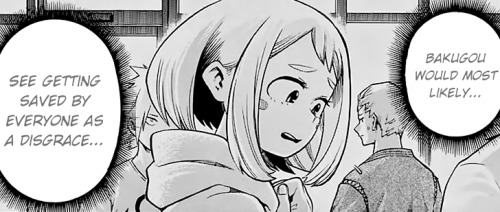
If you look just a little bit closer though she always seems to be walking on eggshells when she’s around others. She doesn’t want to join Deku and the others to try to save Bakugo from the heroes because, it might hurt Bakugo’s feelings.
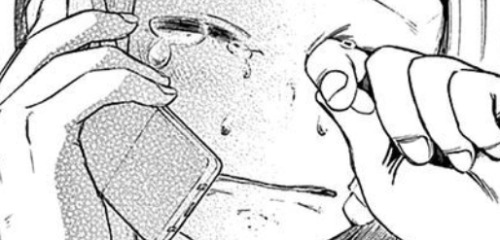
When she loses in the hero tournament, she apologizes to her parents crying not because she feels bad that she lost, but she feels like she failed them. Like it was her job to win and bring money home. However, when Deku comes to check on her in the room she’s already completely hidden her tears.

Going into her backstory we learn that Uraraka is walking on eggshells around everybody due to her own parents, that she’s spent her life trying to be as small of a burden on them as possible because she could see the tired looks on their faces. She’s a child who felt guilty that her parents had to take care of her.
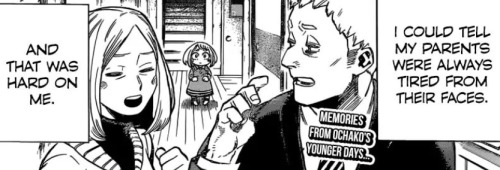
So, for Uraraka her entire life is devoted to making herself seem as small and inconsequential as possible. Other people’s needs will always trump hers. Other people will always have more noble motivations for becoming a hero than she has. Other people’s emotions will always be louder and take priority over hers. Uraraka sees her own emotions and needs as mere trifles that get in the way, and so she always shuts them down. We see Uraraka as a version of Himiko, a high school girl who always appears to be cheerful and well-behaved but is merely repressed.

Uraraka repeats the same unhealthy behavior as Himiko once did. Which is why Uraraka’s first meeting with Himiko goes with Himiko getting such a cold read on her.
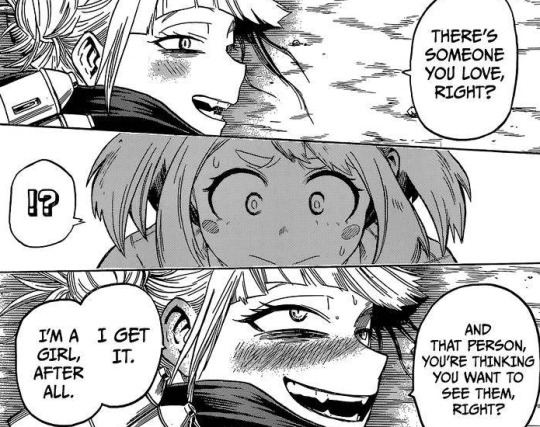
It’s helpful to view Himiko as the flipped version of Uraraka. Uraraka hides everything that’s pleasant about her on the inside, and on the outside appears like a perfectly selfless girl. Himiko is someone who hides her good qualities and instead wears the mask of a bloodthirsty psycho on the outside. While Uraraka lives by denying her selfish desires, Himiko always chases after them and is true to them.
Traits that are repressed in Uraraka, are expressed in Himiko. Especially traits that society sees as bad in girls, like selfishness, being emotional, etc..
The way Himiko acts is especially jarring because she seems convinced she’s a normal person. She’s in her own little world, making friends, getting along with other people, it’s just her friendship just happens to involve stabbing.
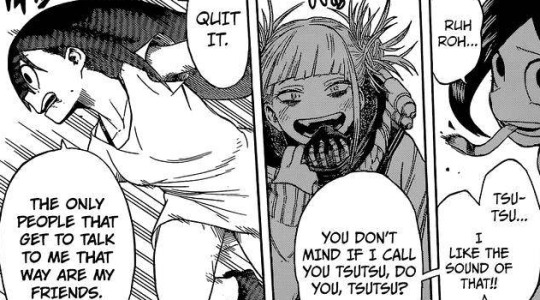


Himiko appears to be a girl psychotically obsessed with blood and nothing else. A girl who only cares about killing other people and chopping them up to bits. When she expresses the feelings deep inside of herself, literally no one can make heads or tails of what she’s saying, she doesn’t sound like a girl just a bloodthirsty monster.


While Uraraka seems like she has nothing in common with what is essentially a weird serial killer, we learn that the exact behavior that Uraraka’s creation is what led to Himiko’s current state of mind.
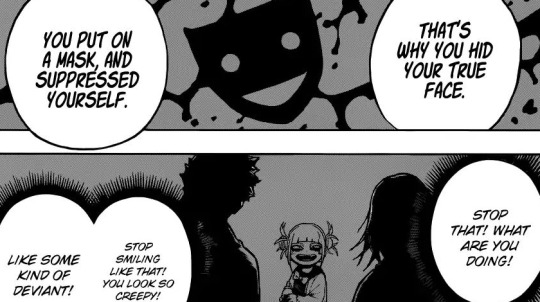
The difference between them is not that Uraraka is a person of higher moral character, or a better person, but rather of circumstances between the two of them. It’s not the choices they made but rather things they were born into and couldn’t control. Uraraka has parents that accept her even when she fails and encourage her.
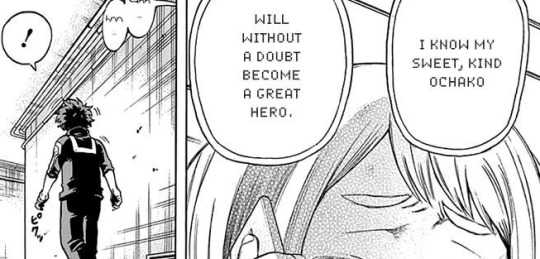
Toga had parents that abused their daughter, and then abandoned her.


Uraraka chose to repress herself, while Toga was forced to become repressed by her parents. While we don’t know for sure if it was physical abuse it’s at least emotional abuse, and it had to be to an extreme extent to make Himiko snap that hard. The same unhealthy behavior but push to extremes gets extreme results.
3. Normal Girl - Himiko Toga
Himiko did not become the way she is because she was lacking empathy or born with uncontrollable urges for bloodlust, but because of the environment around her that always forced her to repress herself. From the knowledge that her parents would never love her for who she really was. Himiko wasn’t born that way she was a response of what was done to her.

People who don’t really know Himiko always judge her this way, that she’s incapable of understanding other people, that she has no empathy for others. She’s almost literally labelled and dismissed as a one dimmensional yandere trope by the people surrounding her.
However, Himiko is in fact always doing the opposite. She’s constantly trying to empathize with others. Her maddened way of talking to both Tsuyu and Uraraka in her character introduction is exactly that, her trying to feel that kind of connection.
Himiko’s fascination for Uraraka is a desire for empathy and understanding. One that you could say even surpasses some characters on the hero’s side, because she’s willing to try to understand the world’s of people who are nothing like her. Himiko’s next most significant action in the manga is to take Camie’s place and go after the kids. While she does fight against them she’s not overly violent, just curious. Deku even reaffirms some of Himiko’s primary traits.

Himiko is always talking a lot and trying to explain her way of thinking to other people, because she wants them to understand her. However, because she’s bad at communicating this tends to come off as babble and a lot of people completely dismiss what she says and don’t attempt to listen.

She expresses two things one a desire to know Deku on a deeper level, immediately asking him very personal, and sometimes very downright invasive question and two she also notices the closeness that Deku and Uraraka have for one another.

Once again this is a repeating theme for the league. Himiko repeats the same desire that Twice has, to become a person who is trusted in the same way.

Once again it’s important to remember that Himiko is just the flipped version of a normal girl. If most people hide their bloodlust and show their good sides, Himiko hides her desire to be trusted and to empathize with other people underneath her bloodthirsty urges she shows on the surface. She positions herself as a femme fatalle, but she’s actually just a girl who’s trying to understand why other people are different then her, and why Deku and Uraraka can have a relationship mutually founded on trust when she can’t.
Himiko’s past was so repressed she never formed real relationships with people. Not only that she assumes that nobody will want the real her, because the moment she flipped and the real her was exposed everybody in her life abandoned her and she had to run away.
After her brush with Deku and Uraraka we see Himiko start to be trusted by her comrades and a marked transformation takes place in her.

We see shades of the old Himiko. A selfish girl who only exists to fulfill her whims. However, we’re shown Himiko is capable of empathizing because not only do Shigaraki’s words get through to her.
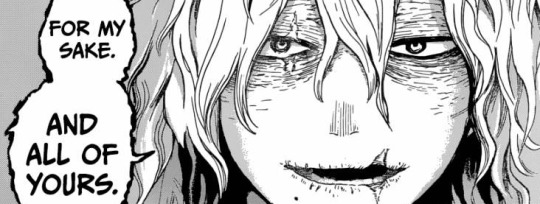
Himiko is also for the first time able to reach the emotions of another person. Remember when Himiko tries to explain how she’s feeling, she babbles, and babbles and nobody listens. However that changes and for the first time, not only does Himiko pick up exactly on what’s troubling Twice, she also comforts him the way he needs to be comforted. She tells him that yes it might be his fault that Magne died, but she sees that he’s doing his best to make up for it and she gently encourages him.
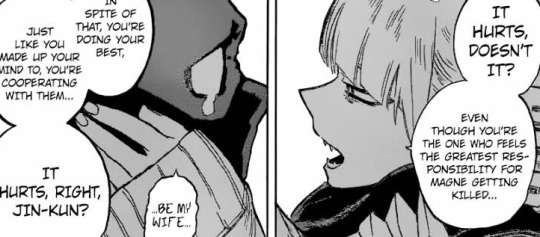
Remember how important this is for Twice. The world has never forgiven Jin for his mistakes. He hit the wrong guy on accident, while obeying the law, and lost both his job and his home. He started stealing to make ends meet, and as a result he lost his mind. When he makes a mistake it always blows up in his face but this time, Himiko notices that she’s panicking and comforts him telling him it’s okay he’s made this mistake and he can still work hard to fix it.

Not only that but she notices what the problem was with Jin, she was able to notice the symptoms of his psychotic breakdown and rather than dismiss it as just Twice being crazy was able to help him in real tangible ways by wrapping her hanky around him and covering him up like he asked. Uraraka has a very surface level kindness, she’s kind but only by walking around on eggshells with everyone. Himiko is able to see through people, but uses that to comfort people on a deeper level.
The “Himiko just can’t control herself because of her quirk” narrative is something that Himiko rejects herself. Because that’s not what Himiko wants. Himiko doesn’t want to be special or different from other people.
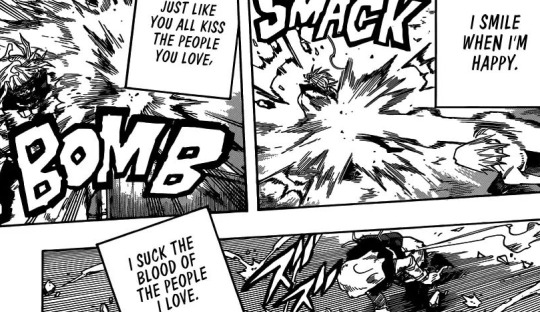
Himiko sees herself as normal, and what she desires to be understand and be understood by other people. She doesn’t like Curious’ narrative for her because it made her out to be a freak or someone special when Himiko is trying her best to get others to understand her as a normal girl. Himiko can’t repress herself anymore, she can’t become normal the way her parents taught her too so not permanently broken, and forced to always express herself she’s trying some other way.

What she wants isn’t to hurt other people, not really though. Those thoughts just turn violence, because Himiko is herself a person who’s endured a lot of violence. Himiko is basically a child that’s been on her own living on the streets and surviving for years, with all the dangers that entails, and also people who can shoot lasers and punch things really hard chasing after her.

The more she’s isolated and on the run, the more violence she endures, the more violent and unhinged her thoughts become. The more she’s exposed to people who accept her for who she is, the more she’s trusted by those people, the more empathic and sensitive Himiko becomes instead. Himiko’s desire isn’t violence, when she’s pushed to her utter limit she says what she wants is to become a girl like Uraraka who is just loved and trusted by others for who she is.
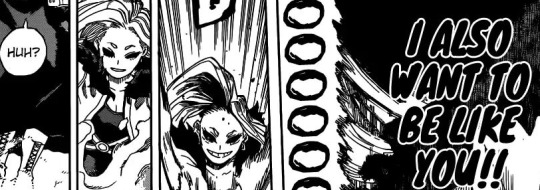

And I genuinely believe at the core of Himiko’s character this empathic girl exists. Himiko becoming violent and unrepressed doesn’t mean her empathy disappears. The complexity from Himiko is that she’s both the knife wielding psycho and the normal girl who just wants to have friends at the same time. If behind every normal person there’s a monster lurking is true then the opposite is true as well, behind every monster there’s a normal person.
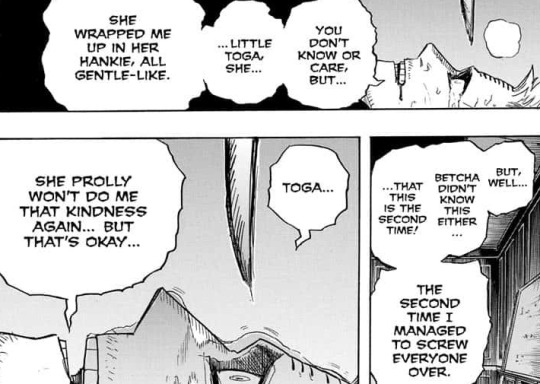
This is an idea expressed by Twice again. One of the villains that Hawks dismissed as a bad person, was capable of showing him compassion and gentleness even when he screwed up. Toga was capable of empathy for Twice besides the use he had for others. Toga herself is shown to be capable of more empathy than Hawks, who is one of the most selfless characters in the series, and who is convinced his actions are always done in order to save others.
However we see their treatment of Twice is so drastically different. Hawks treats Twice in a selfish way refusing to listen to what Twice wants, and only ever used Twice as a tool to exploit. Twice himself thinks that now that he’s no longer useful, Himiko won’t be kind to him anymore however we see the opposite.

Twice admits to Toga that he’s the reason that everyone is in danger right now and he completely failed, and he’s not going to come save them. He admits that he’s useless and Twice himself said Toga wouldn’t be kind to him anymore. However in that moment, Himiko ignores the fact that her life is literally in danger and everything is going to hell around her to comfort Twice one final time and tell him the words he needs to hear.
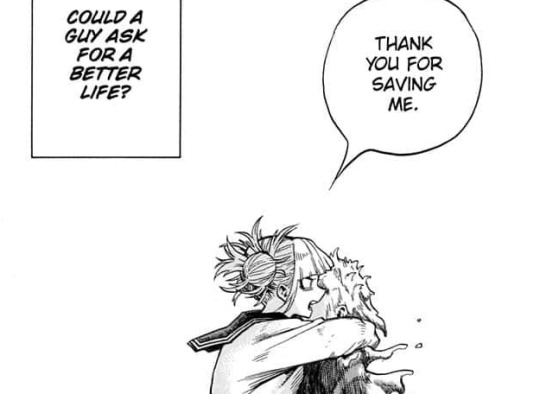
It’s literally the single most empathic moment of the manga, and it’s in direct contrast to Hawks’ behavior. A hero as devoted to saving other people as Hawks, who genuinely likes Twice as a friend doesn’t show him any empathy at all and even stabs him as the back. A psycho like Toga puts her own feelings aside and notices Twice’s feelings, and gives him comfort and thanks him in his final moment because to her Twice has value as a person beyond what his use is. That Himiko is capable of this kindness, but equally capable of her monstrous actions earlier in the series is what makes her human. Her kindness doesn’t make her any less mosntrous, and her monstrous qualities don’t make her kindness go away she’s both at once, rather than either or. That’s where the complexity comes in.
Toga is a very human character precisely because we see her at her most monstrous, and we see that girl slowly relearn how to express the kindness that’s always been inside of her in healthier non-stabby way. A normal girl who learned how to be a monster to protect herself. A monster who is slowly relearning to be a normal girl.
#himiko toga#jin bubaigawara#league of villains#league of villains meta#league of villains friendship#mha meta#my hero academia#my hero academia meta#my hero academia villains
632 notes
·
View notes
Text
Why Sherlock Holmes FGO is Sus: Theories and More
Before I begin, I’d like to give thanks to my wonderful friend for all the points, art, and info searching that have been made to produce this piece, I can’t appreciate you enough for the effort you put in. 🥺🙏💕
Alright now on to it!
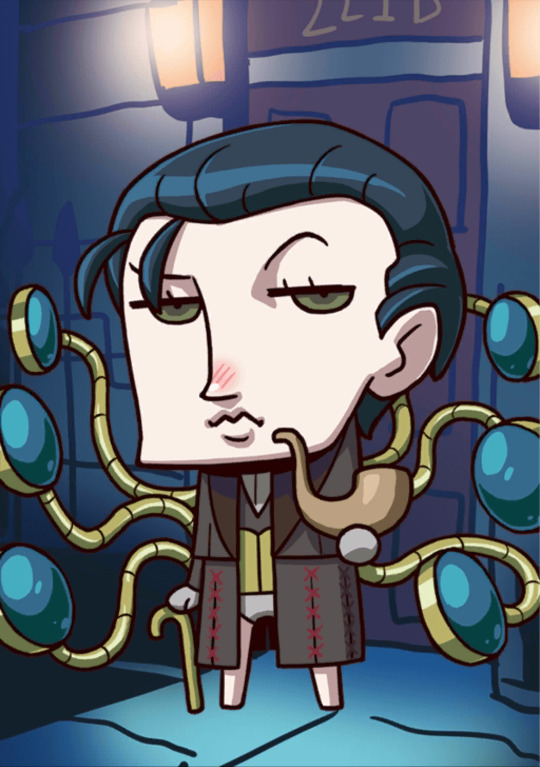
INTRODUCTION: Humble Beginnings (Identification of the Abnormal)
If you’ve played the app Fate/Grand Order for a while you’d know about the Heroic Spirit we first encounter in a hole within Camelot’s dessert whilst going to the Atlas Institute. Smart, handsome looking, and sharp enough to discern our True Name, this man of mystery has been seen as an oddball by many long time players of the game. There are many aspects about him that raise doubt about his credibility, is he truly what he wants us to think he is? That servant is Sherlock Holmes (Ruler) and there are many theories about him having some secrets, about him either being a Foreigner class, Beast class, or something else entirely. We are attempting to catalogue all this information in one place for maximum clarity.
SECTION 1: Other Character’s Reaction (First Impression is the Best Impression) *WARNING LOSTBELT 1 AND 2 SPOILERS AHEAD*
From the first encounter in Camelot right until the end of Lostbelt 2, there are many instances of characters reacting to his presence in….interesting ways.
Bedivere, when first coming in contact with Holmes in Camelot says that "I suppose I've never really been good with people like him. He reminds me of Merlin."
It could refer to the mysterious manner in which both Holmes and Merlin conduct themselves, but better to keep in mind that Merlin is a Grand Caster, and that he manifests as a servant due to specific circumstances (he is not dead).
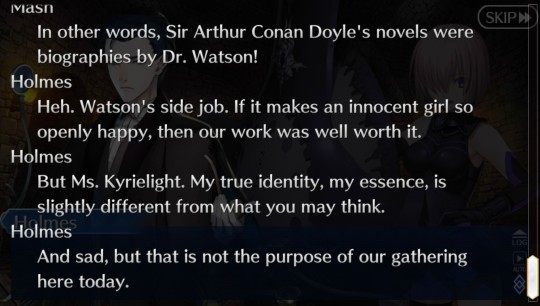
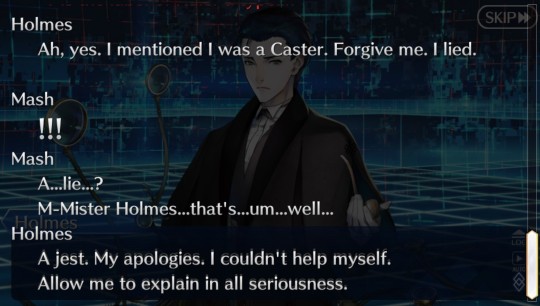
In Camelot, Mash assumes that Holmes must be Caster class and that the original novels by Sir Arthur Conan Doyle must have been biographies penned by Dr. Watson under a pen name. Holmes corrects her, saying that: "My true identity, my essence, is slightly different from what you may think. And sad, but that is not the purpose of our gathering here today."
This dilemma is also present in the Sherlock Holmes Trial Quest (which mostly tackles the debate of whether he's a fictional character or someone who actually existed). Holmes has a line where he says:
"Ah, yes. I mentioned I was a Caster. Forgive me, I lied."
This is however immediately followed up by:
"A jest. My apologies. I couldn't help myself."
This sort of backpedalling raises a doubt as to whether he was really Caster class before, so the nature of his former class is still a mystery. He later mentions that his Ruler class is the World telling him that not all illusions and dreams need to be laid bare.

When meeting with Salieri in Lostbelt 1, Holmes introduces himself as such:"I'm Sherlock Holmes, Chaldea's administrative advisor. I became a servant through unusual means, just like you."
Salieri was only summonable as a servant because of his reputation caused by the fact that he killed Mozart. He is under the effect of Innocent Monster. It can also be said that Salieri is a lostbelt servant and is significantly more sane than he would have been in a normal summoning, that was the unusual summoning that Holmes was refering to. Does this mean Holmes is not from Proper Human History?
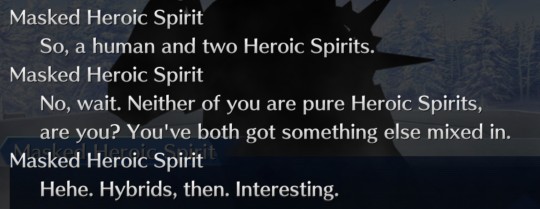
Sigurd (who's under the control of Surtur), while attacking us in Lostbelt 2 says this: "So, a human and two Heroic Spirits. No, wait. Neither of you are pure Heroic Spirits, are you? You've both got something else mixed in. Hehe, hybrids then. Interesting"
This is in reference to Holmes and Mash, who are alongside the master at this moment. Mash is a demiservant (human+servant) hence the "Hybrid" comment makes sense, but Holmes? What is the "something else" mixed in with Holmes?
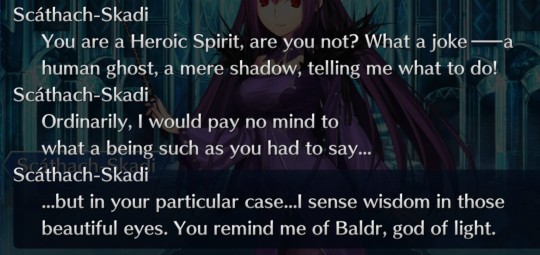

Later in LB2, Holmes requests the assistance of Scáthach-Skadi in beating Surtur. Skadi says that normally she would never pay mind to what a mere Heroic Spirit had to say but: "...but in your particular case…I sense wisdom in those beautiful eyes. You remind me of Baldr, god of light." Quite a bit later, she also has this to say:"Perhaps those piercing eyes of yours in fact surpass Odin's? Mystic Eyes, perchance? ….No, that's not it. They merely reflect your wisdom born of human history's cumulative accomplishments."
She says that's not it, but the fact that it was the first thing she thought of shouldn't be ignored.
Baldr is the god of light. Holmes' attacks consist of beams of light, and his cane lights up when he's using it in battle.
In Norse legends, Odin is said to have sacrificed one eye to the spring of Mimir in order to get ancient wisdom, the ability to perceive everything in the world.
SECTION 1.5: More Reactions (From JP Only)
Since it is JP only and there is no official translation for NA yet, this information cannot be 100% confirmed in any way. (Most of this is from Reddit translation done by fans). But as these are also important, it's best to put this information separate section.
Moriarty's interlude involves him finding a micro-singularity in London. At some point the transmission between Chaldea and the master gets cut and Moriarty reveals he created this scenario, made the singularity and everything to get one on one time with the master. He tells us not to trust Holmes. When the time comes, we as master should choose Moriarty over Holmes.
It has to be kept in mind that Moriarty is not a good guy, he is a character created entirely to oppose Holmes so it is natural that he doesn't trust him. For all we know, it is just emotional manipulation.
Moriarty's very nature is tied to being the antithesis of Holmes. Holmes might theoretically go against us for the sake of humanity while also trying to keep us safe (the master is in a way, a Watson replacement to him after all) while Moriarty would gladly let humanity burn for the sake of us but also for the sake of being completely opposite to Holmes and keeping his identity as such.
However he does raise valid points, how was Holmes able to rayshift? This part was never explained, and he also mentions that his hypothesis has a fatal contradiction in the fact that Holmes risked his life to save ours. What can be inferred from this is that Holmes is a good man and is on our side, but there is something very weird about him that should not be ignored.
In Lostselt 5 it is mentioned at one point that Zeus called Holmes dangerous, he mustn't look at Zeus or the other gods and that his eyes are enemies of the world.
It has to be mentioned that this is some heavy emphasis on Holmes' eyes (Skadi mentioned Holmes' eyes twice, and she was a god as well). Is it because of the nature of Holmes that he is the one that reveals all truth? Is that in some way detrimental to gods, magic and the world in general?
Recently, from Holmes' skill upgrade interlude there was a section about Holmes saying that he is always an ally of justice and that while he may be on our side, he is still capable of evil but it doesn't change the fact that he is our ally. Even then it seems he has some secrets that can't be understood by himself.
By now with the presence of Dr. Jekyll and Helena and their recounts on what happened, it is confirmed that Holmes was actually "alive"(?)
Some of the adventures penned by Dr. Watson were actually censored versions of the original happenings, which were magical in nature.
Holmes was traumatised(?) by Helena's death back when they were both alive. He swears he would never let that happen again. (remember what happened in lostbelt 2…)
It seems that Holmes himself is not fully sure of what is secret about him. Since he utterly dislikes talking about something without being 100% sure about it (this tendency of his has gotten us in trouble before) plus his general secretive nature, it can be said that this is why he wouldn't talk about that.
SECTION 2: Weird Things That Holmes Does (And Other Questions)
Heroic Spirits are anything but normal, but there are few servants who break the norm even further, and Holmes is one of them.
Holmes is able to Rayshift (presumably) from London, to Camelot, and then to Shinjuku. There are very few servants who are able to manifest themselves.
Musashi also appears here and there, but it's not a deliberate choice on her part. She is not able to predetermine her next destination.
Arthur travels from a parallel world to this world, but this is due to "chasing after a certain powerful antagonist, evil omen" - so he tells.
Beast class has the skill of Independent Manifestation which would allow the servant to manifest anywhere they'd want. Merlin, Tamamo Vitch and Shiki possess it. However, it has to be noted that Holmes' rayshifts have a significant toll on his saint graph, as he is unable to fight or defend himself by the time we meet him in Camelot. While normal Independent Manifestation shouldn't lead to the depletion of the user's saint graph. Holmes' class is unknown at the time of his rayshifting.
At the time of summoning, Heroic Spirits usually reveal their class and True Name (there also are exceptions to the rule). At the time of his summoning, Holmes doesn't reveal his Class: "Are introductions necessary? I am a detective. If you were expecting a hero, my apologies...But if you wanted a detective or an investigator, you drew the right card."
In the case of EOR Servants whose names haven't been found, they reveal their class.
Who summoned Holmes? The only thing we know regarding his presence was that it was first clearly there when he tampered with information in London.
Holmes' illustrator is Yamanaka Kotetsu, who was also the illustrator of the beasts Tiamat and Goetia
The artists who design and illustrate the characters tend to do it in groups of servants who are related to each other in some way (Pako with Arjuna and Karna Chacha and Nobunaga; Miwa Shiro with Brynhildr and Sigurd). It is strange that Kotetsu designed only Holmes, Tiamat and Goetia.
(NEW ADDITION) It should also be noted that as an illustrator Kotetsu has had previous works in a Lovecraftian Guidebook and is also the artist to the Alien God Preistess, somewhat showing how their work leans more to the outerworldly.
SECTION 3: The Design
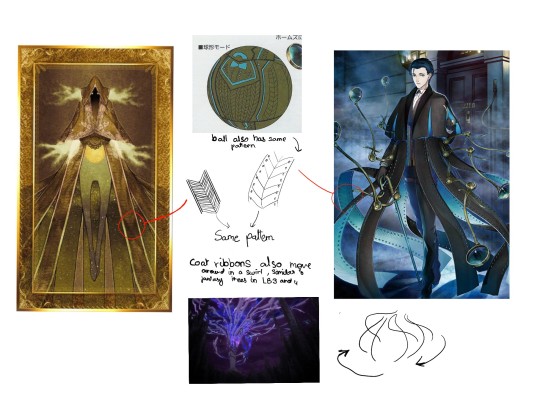
It is a very commonly noticed fact that Holmes' coat in his third ascension has a very similar shape to that of the Foreigner card artwork.
The pattern work on the coattails of the foreigner art and the inside (blue) part of Holmes' coattails have a very similar, if not exactly same pattern running down the entire length of it. The sphere summoned in Holmes' Noble Phantasm also has the same pattern on its sides and front.
There is a "fog" around Holmes in his third ascension, which is reminescent of the smoke in the card art. (Also can be the London smog).
The glowing section of the abdomen of the being reminds one of the metallic corset that Holmes wears.
There are 4 notches of smoke on either side of the being (total 8), under their cape. If we stretch our interpretation, then it could mean Holmes' arms and the metal arms that he has is also equal to 8.
In that tangent, the shape of the coat is also similar to that of Saver class Buddha, the fantasy trees from Lostbelt 3 and 4, and the Shadows made by the 6th imaginary element.
The Endless Knot / Shrivatsa symbol on his shoulders is one of the many references of his connection to Tibet (faking his death after the Final Problem). It is an important symbol in both Jainism and Buddhism.
Some of its interpretations include:
The eternal continuum of mind.
The union of wisdom and method.
Since the knot has no beginning or end it also symbolizes the wisdom of the Buddha
the endless cycle of suffering or birth, death and rebirth within Tibetan Buddhism.
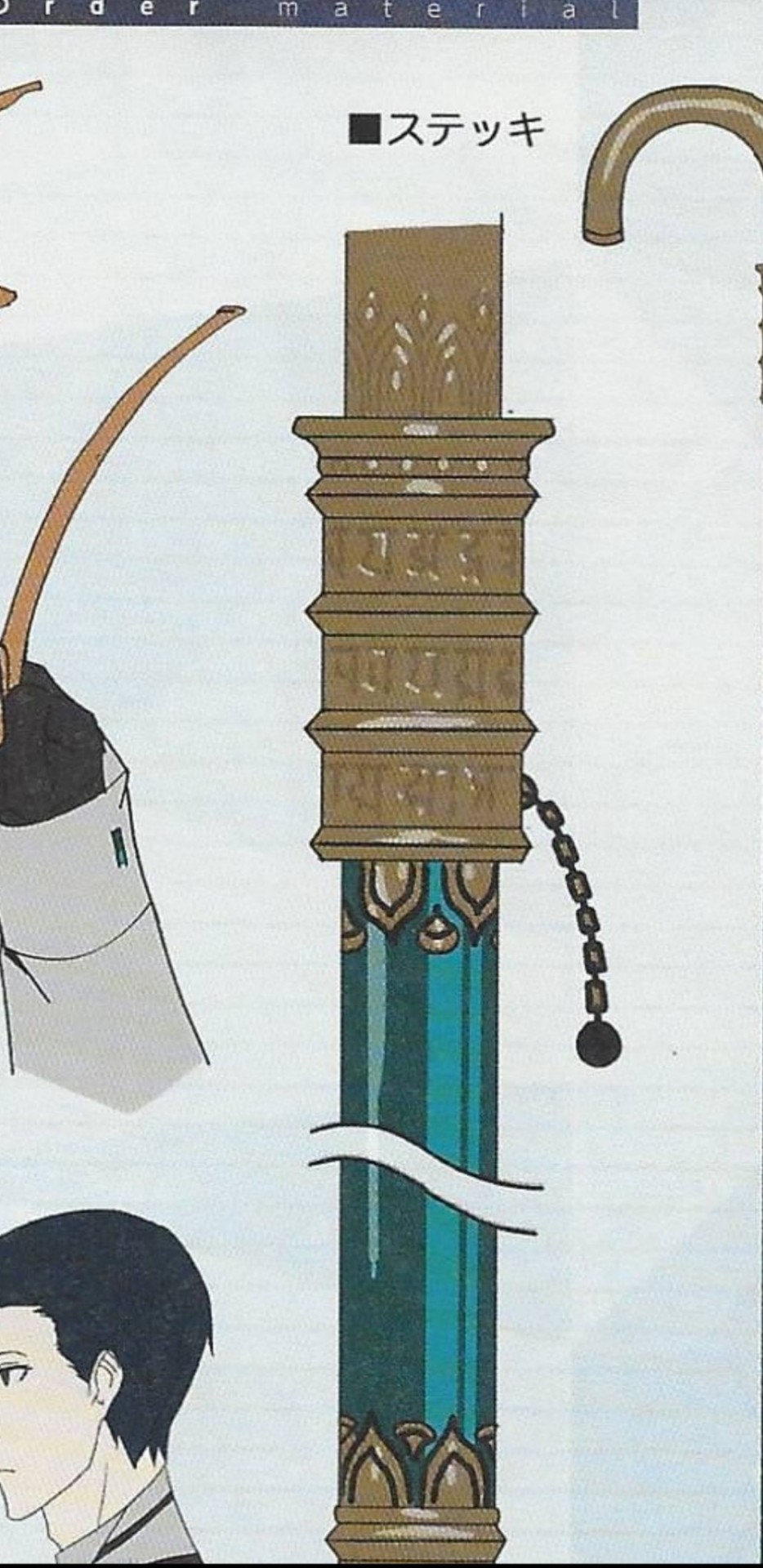
The cane that Holmes wields has a pattern on its handle in the shape of a Prayer Wheel.
However, we are not able to find the meaning behind the script on the cane. Both of us attempted to translate it but failed. If anyone can translate the meaning it would be greatly appreciated.
The holographic books in the base of the unidentified sphere have a pattern on their front that greatly resembles a lotus.
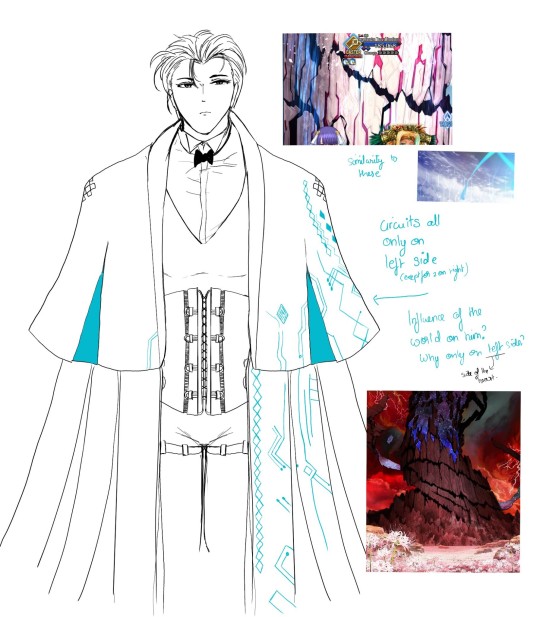
In Holmes' third ascension, there are a number of magical circuits on his coat.
The circuits are almost only on his left side, with very few circuits on his right side. It's not like it was woven into it, were that the case the circuits would have been all over his coat in a more even distribution. It's almost like an impact radius.
The circuits are very similar to the ones visible on the title screen of the lostbelts, as well as the patterns seen on the fantasy trees.
CONCLUSION SECTION: Something's Up (It's Big Brain Time)
It's clear that something is very strange about Holmes, from his interactions to his design, it's clear that there is too much effort into throwing these hints that it's not just a red herring.
Is he a Foreigner? Beast? Counter Guardian? Some other unknown extra class? It cannot be said at the moment. Holmes' role as a revealer itself is dangerous to mystery and magic, so it can be anything.
It is also not necessarily true that just because Holmes has all these abnormalities, that he will betray us, or is on the side of evil. When has there been a clear cut side of good or evil anyway? It can be argued that we are the villains in some way, as we bring about the end of these timelines to safeguard our own proper human history.
Holmes has always been on the side of humanity and will continue to be, the question is what the reveal will be, why and how. That, only time and future chapters can answer, all we can do is speculate.
#fate#fate grand order#fgo#Sherlock Holmes#lostbelt spoilers#foreigner theories#fuccyoutumblrfuccyoutumblrfuccy#hope yall enjoyed!! feel free to give yalls thoughts!!#and again thank you soso much fremd🥺🥺🥺🙏🙏
278 notes
·
View notes
Text
the great pastiche: sherlock holmes (alter)
Where the original Sherlock is the personification of the concept of detective, this Sherlock is born of his ever-mutating legacy. Dynamic, hungry, and erratic of temperament, he can be described as the crystallization of conflicting "truths" regarding Sherlock Holmes.
In other words: a runaway character study who blames the original for his state.
---
My take on what a Holmes (Alter) would look like! Also mirrored on AO3. Check out more beneath the cut.
BASICS Class: Archer Alignment: Chaotic Evil Canon Source: ▓▓▓▓▓▓▓
PARAMETERS Deck: QAABB Strength: C Magic: A+ Agility: A++ Endurance: C Luck: E Noble Phantasm: EX
CLASS SKILLS Independent Action (A+) - Increases Critical Strength by 12%. Magic Resistance (E-) - Increases Debuff Resistance by 5%. Mad Enhancement (EX) - Increases Buster Card performance by 12%.
SERVANT SKILLS Innocent Monster (EX) - Gain Critical Stars each turn (3 turns) (6-12). Incr. party's Critical Strength (3 turns) (20%-40%). Reduces own Defense by 20% [Demerit] (3 turns).
... if the Master looks carefully, they will catch a glimpse of innumerable eyes blinking from the shadows of his coat.
A Seven Percent Solution (EX) - Apply Guts (1 time, 5 turns) (3000-5000). Increase NP Gauge (30%-50%).
The readers refused to accept the outcome of Reichenbach Falls. Their outcry was powerful enough to usher in Holmes' return, even though survival should have been an impossibility. Throughout the ages the great detective would be "reborn" time and time again. Time travel, cybernetics, witchcraft, inexplicable forces, sheer luck: all these were acceptable "truths" of Sherlock Holmes' life, for Watson's biographies cannot be confirmed as an absolute, accurate account.
Although Holmes' endurance and strength is remarkably average for a Servant, he is extremely tenacious and difficult to kill.
Illusion (False) (B+) - Apply Invincible to all allies (1 turn). Incr. party's star generation rate (3 turns) (30%-50%).
By its strictest definition, illusion is a form of magecraft that manipulates the mind's perception. Holmes accomplishes this feat through his mere existence. The passion stirred by his adventures created a simple mass delusion: "Sherlock Holmes was a real person." Whether or not such a man existed was a non-issue, for fervent fans sought the character they fell in love with - not a true human being. Even as Holmes pastiches continued to be churned out, entire organizations piously combed Doyle's stories to piece together the "real man's" life.
For Holmes, this skill acts as a form of mental persuasion. For example, he can trick Servants with lower-ranked Magic Resistance to believe that a building or person before them has vanished into thin air. He is limited to a city block with his illusions, as he cannot force others to believe in the fantastical and outrageously impossible.
NOBLE PHANTASM The Great Hunt: No Matter How Improbable the Truth Is Rank: EX Type: Anti-Unit/Anti-Unit (Self) Effects: Reduces all enemies' defense for 3 turns. Party-wide NP Gain up for 3 turns. Party-wide damage up for 3 turns. Overcharge grants stars.
The fanatical hunt for "truth" in the midst of fiction, actualized as a level of magecraft capable of altering the properties of its subjects. Regardless of whether the proof is present in the actual World - whether it was forged or whether it existed at all - Archer is capable of proclaiming "This is true for Sherlock Holmes," so long as he can elucidate on the connection. By a verbal declaration, he is able to modify his parameters and that of his allies.
He can likewise create weaknesses in his opponents through this manner of conspiracy, though the process becomes insanely complicated and difficult if the targeted Heroic Spirit is close to the Age of Gods. The reach of his Noble Phantasm is most effective past the 1700s. Those prior to that era have an easier time of rejecting his claims and maintaining their integrity, for their ties to Doyle's works are even more tenuous.
In short: even pastiches have their limits.
PROFILE Where the original Sherlock is the personification of the concept of detective, this Sherlock is born of his ever-mutating legacy. Dynamic, hungry, and erratic of temperament, he can be described as the crystallization of conflicting "truths" regarding Sherlock Holmes.
In other words: a runaway character study who blames the original for his state.
Bond 1 Prone to quoting the pastiches he's comprised of. Unbearably theatrical. His mannerisms reminds one of a first year drama student desperate to pass.
Bond 2 "Sherlock Holmes" is a concept belonging to the people. Regardless of who or what the detective was, the masses' love for him overrode even Doyle's canon. A secret serial killer, a deluded drug addict, a modern day police officer, and so on - Archer is the vessel of these endless possibilities and wears the appropriate mask after carefully assessing the situation.
The original Sherlock stripped away the darkness of uncertainty while Archer only deepens it. Though he remains a detective, his obsession is with himself.
Bond 3 ○ Independent Action: A+ Though Arthur Conan Doyle was the creator of the great detective, his work's "life" continued and evolved beyond his death. The concept of "Sherlock Holmes" adapts to any place, time, or genre. ○ Madness Enhancement: EX Archer should not exist. He is the manifestation of contradictory lives that cannot coexist. In exchange for serenity of mind, his NP and magic parameters have increased considerably. The Master can have a rational conversation with him but must tread carefully. This Holmes is driven first and foremost by fanciful "what ifs" and is desirous of a wonderful detective drama. As a Servant, he is inherently unreliable. ○ Magic Resistance: E- “It's unusually low, you say? Well, I am entirely at the writer's mercy.” “... of course I can't change it!”
Bond 4 Sherlock Holmes was not a villain. He was written with his faults, but those made him all the more charming to the target audience. Still, Archer regards the original canon with bitterness. “The carelessness of Doyle and Watson made me what I am now."
The contradictory details regarding Watson's war wound and wives, the mention of cases never elaborated upon, the shroud of secrecy surrounding Holmes' personal life... all of these excited the imaginations of Doyle's readers and established a rampant following devoted to deconstructing, rewriting, analyzing, critiquing, theorizing, and adapting the detective. At some point, the entity Sherlock Holmes ceased to become a single story and exploded into a plethora of wild tales.
Archer will valiantly play the part of the hero if it suits the story and will just as gleefully play the part of a monster. For a character to be loved by the readers, he must fulfill their fantasies.
Bond 5 Ultimately, he is an anti-hero born of love and fascination. A story that lives beyond its pages and continues to grow is one that resonates deeply with the people. Archer is aware of this fact and, though he will lament his condition, he refuses to berate the readers. Satisfying them is his purpose as a fictional character. In that, he has wildly succeeded.
... still...
Extra (Unlocked After Interlude) The fact that he is an imitation matters little. A pastiche's purpose is to deceive and entertain its audience. This "Sherlock Holmes" will strive to do both until his end.
MAX BOND CRAFT ESSENCE: SUSSEX DOWNS Effects: When equipped on Sherlock Holmes (Alter), increase all allies' Critical Damage by 10% and NP Gain Rate by 10%, as long as he is on the field.
When you have no past, you are permitted to be everyone and everything. A genius detective. The product of an affair. Jack the Ripper. A demented cocaine addict. An ego-maniacal doctor. And so the list goes on.
There is little I can call mine. Regardless of who I become or where I am placed, those inconsequential pieces are the constants of my existence. The companionship of John Watson. The love for a Stradivarius. The comfortable hearth of Baker Street 221B. The admiration of bees.
Yes. "Sherlock Holmes" lived peacefully in Sussex Downs, tending to his hive. That is one of the few indisputable truths I can cherish.
INTERACTIONS Sherlock Holmes (Ruler) ▓▓▓▓. In other words, he wants nothing to do with him. James Moriarty The fated rival. Though, it appears he's going by the name "Mr. Dandy," now? Which pastiche was this? ... he came up with it himself? Ah. He really hasn't aged well. Henry Jekyll Hyde is much more fun. Helena Blavatsky She's still pretending to be young, huh? Mash Kyrielight An ardent brown-noser of the original. ... even so. He treats her as if she's a higher-ranking employee in a corporate workplace. Scheherazade She is the same as him. Nobody knows the truth of those nights, save for her. He genuinely wishes to speak with her, but... It seems his wild nature terrifies her. As a result, he looks but can never find her. It is a bit like a dog chasing a cat. Hessian Lobo Reminds him of Toby. Even if he is a little more bitey. He doesn't care for the rider, only the wolf.
31 notes
·
View notes
Photo
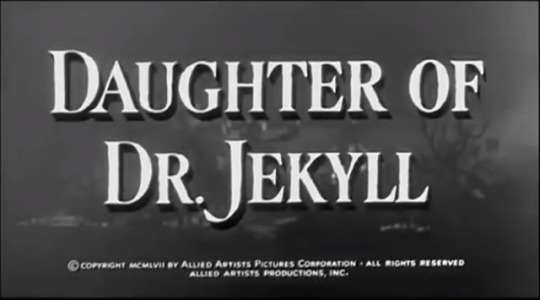
Daughter of Dr. Jekyll
John Agar’s in this. So, for that matter, is Gloria Talbott from Girls Town and The Leech Woman, and it was directed by Edgar G. Ulmer, who brought us The Amazing Transparent Man. It was released on a double-bill with The Cyclops, which I’ve already reviewed, and while all that seems to promise us an utter crapfest, the premise at least sounded intriguing. Then I actually pressed play, and was greeted by an opening consisting of gray fog, theremin music, and a bored narrator. Oh, yeah. This is gonna suck.
Said opening narration very (and I mean very) quickly introduces us to the tale of Dr. Jekyll and Mr. Hyde, in which a distinguished scientist used a strange potion to turn himself into a werewolf! Wait… that’s not what happened in Dr. Jekyll and Mr. Hyde at all. Wasn’t it a story about how every person has the capacity for evil and that’s part of what makes us human, and… aw, fuck it, this is a John Agar movie. Okay, sure, a werewolf. Whatever you say, Portentous 50’s Narrator. Moving on.
Janet Smith and her fiancé George Hastings arrive at her family’s palatial home, which she will inherit on her upcoming twenty-first birthday. That’s not all that’s come down the family line, though. Janet’s last name is not Smith, but Jekyll, and she was born after his experiments in lycanthropy had begun. Might she pass it on to her children? Or might Janet herself not be affected? Or is her father’s old friend Dr. Lomas an evil hypnotist using her for his own ends? Wait… what?

After sitting through crap like The Incredible Petrified World and Creatures from the Abyss, I kind of want to give extra points to Daughter of Dr. Jekyll. It’s actually fairly well-constructed for the most part, it’s rarely boring, and the sets representing the Jekyll family estate are very nice. There’s a plot I can follow, I know who the characters are, and so forth… my standards have dropped so low, that’s actually kind of impressive. The creepy delivery guy who hangs around whittling stakes and sowing discontent is pretty effective, himself, even though he’s a very one-dimensional character.
There’s still plenty of badness to be had, of course. The movie appears to be set in the first decade of the twentieth century, but it’s not very committed to that. The sound is frequently weird, from the absolute cacophony of frogs at the opening to musical cues that I swear were stolen from Robot Monster. There’s a random cameo from a very 50’s pin-up girl who appears, gets killed, and vanishes without us ever even learning her name. The climactic fight between George and the werewolf is extremely shatnery and the werewolf makeup is even lamer than in Werewolf in a Girl’s Dormitory.
Even worse, there’s an entire subplot that kind of doesn’t even bother happening. Most movies that are going to involve angry villagers have some scenes in a local pub or something to show the rabble being roused – even The Giant Spider Invasion had that. In Daughter of Dr. Jekyll we hear about angry villagers from a couple of different people but never actually see them until the pitchfork-toting crowd appears out of nowhere at the end. It’s like an angry flash mob. All we needed was a few thirty-second scenes, but I guess this movie couldn’t afford villagers. The whole climax is obscured by fog that makes it very hard to tell who’s who and what’s going on.
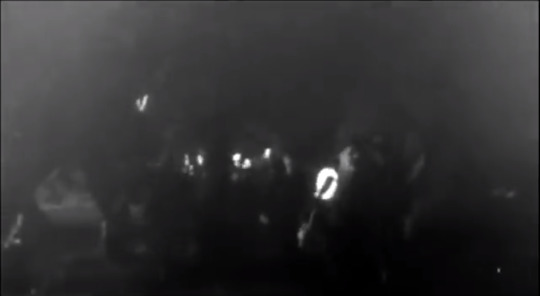
As usual, we’re confused about who our main character is supposed to be. The person whose eyes we see the story through is Janet. It’s Janet whose arc we follow, and Janet who we learn the most about, but she’s a very frustrating character because she is entirely without agency. The only choice she appears to make in the entire film is agreeing to marry George, before this story begins. Otherwise, she’s letting him or Lomas tell her what to do, completely incapable of making her own decisions (she even says as much, when George asks her if she’d like to go to London and elope). When the action occurs, she’s drugged with sleeping pills or in Lomas’ hypnotic thrall.
Even the very premise strips Janet of control over her own fate. She is not the heir to a scientific legacy (as other descendants of Henry Jekyll in other movies have been) but to a genetic one. Tanya in Lady Frankenstein chose to continue and improve on her father’s work. She might not have. Janet, on the other hand, cannot opt out of the family’s potentially tainted DNA. This lack of control is reinforced through smaller events as well: George won’t let Janet change her mind about marrying him, and when the young couple tells Lomas they don’t want his money or estate, he reveals that both were actually Janet’s the whole time. Like Eddie in The Beatniks, Janet is basically a victim even when good things are happening – they always happen to her rather than because of her.
The character who actually tries to take control of the situation, and who I think we’re supposed to see as the ‘hero’, is George – but we know nothing about George. He loves Janet and he has terrible fashion sense, and that’s really it. It’s her family we learn about, and her mental disintegration that follows. George spends most of the movie just hovering on the sidelines watching, and even at the end he doesn’t do very much. He explains what’s really going on to Janet and the audience (though we’ve already figured it out) and gets his ass kicked by a geriatric werewolf. The monster is actually killed by the mob of villagers, while George just stands there with Janet sobbing into his shirt. The movie probably wouldn’t have been much different without him.

The thing that really takes the viewer out of the movie, however, and does so repeatedly for its entire seventy-minute running time, is that it can’t make up its mind what its monster is supposed to be. I already mentioned the narrator’s conviction that Mr. Hyde was a werewolf, but it gets way weirder and more confusing than that.
The servants at the Jekyll house also talk about werewolves, and tell Janet and George in threatening voices that they know how to deal with such creatures. On the other hand, when Dr. Lomas himself tells them what happened, he tells the story we’re familiar with: Dr. Jekyll wanted to separate the good and evil parts of a person, and ended up giving the evil in himself a free agency of its own. This made me think maybe the servants were just a bunch of superstitious peasants? Maybe they called Mr. Hyde a werewolf because they didn’t know what else to call him? That almost started to make sense… but then George picks up a book about werewolves, and in its pages he reads that a werewolf leaves its tomb on the night of the full moon so it can drink blood, and can only be killed by a wooden stake through the heart.
Wait. What?
That… that’s not werewolves! Werewolves are killed by silver bullets! Stakes through the heart are vampires! Werewolves don’t have tombs! What is going on here?
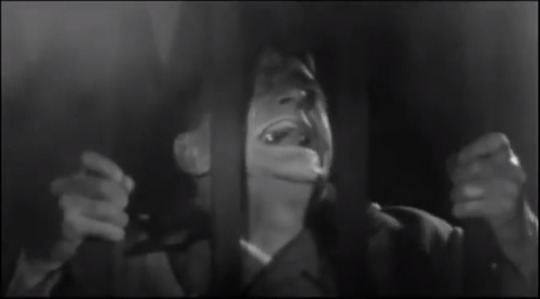
By the time the climax rolls around, we’ve already figured out Dr. Lomas’ evil plan, and sure enough, it turns out he’s hypnotizing Janet into believing she’s a werewolf so she will commit suicide and he can have her family’s money. That makes sense in a Scooby-Doo kind of way, I guess, and I can accept it for the sake of the movie… but then he actually turns into a werewolf and goes out to suck blood! What? What? How did that happen? Was he playing with Jekyll’s formula? But Jekyll turned into Hyde when he took the drug, not at the full moon! What the fuck?
The movie never explains itself. We’re just supposed to take this bizarre conflation for granted. But vampires, werewolves, and Mr. Hyde are three totally different types of monster! Vampires are undead corpses who avoid decay and death by sucking blood. Werewolves are living people who transform under the full moon and kill out of animalistic rage. Mr. Hyde was Dr. Jekyll’s repressed evil side given form. You could probably argue that all three have the same root, in our need to conform to certain standards in order to make society work, but Daughter of Dr. Jekyll doesn’t try to do that. It just mixes and matches story bits at all, combining conflicting mythologies and leaving very visible seams. In fact, we may as well consider this a Frankenstein movie, too!
I can only imagine the fun Mike and the Bots would have had with this confusion. I’m picturing a game show in which they must match the weapon with the monster, and if they lose, they get eaten. Tom would have figured out that you survive by picking what ought to be the wrong answer. Crow would not.
The opening narration of Daughter of Dr. Jekyll notes that Robert Louis Stephenson’s book is a classic, and it is so for good reason. It’s an exploration of the evil within us all, the intrusive thoughts and secret desires we would rather attribute to an alter ego than ever admit to anyone, and the fact that the sinner is as much a part of each of us as the saint. Daughter of Dr. Jekyll throws all that out the window by equating its villain with a vampire/werewolf, making him a sort of mindless monster. It’s confusing and annoying, and its compelling source material deserved far better.
#mst3k#reviews#episodes that never were#daughter of dr jekyll#oh shit it's john agar#50s#you is a warwelf#just fuckin weird
18 notes
·
View notes
Text
Dr. Jekyll and Mr. Hyde rewritten, Ch. 01
(A/N: I didn’t think it was necessary to include warnings for this one, except for the fact that I shamelessly rewrote the 2nd chapter from the book)
1. Searching for Mr. Hyde Gabriel John Utterson was, as a lawyer, not someone who could easily be startled. But the incident his cousin Richard Enfield had told him about was nagging at him. No, nagging at him was an understatement. Ever since he had heard the story, he had been plagued for nightmares. They were always the same. His dear friend, Henry Jekyll, being haunted by dark shadows, usually in the shape of a man. Or a replay of the occurrence Enfield had told him about. The man was always faceless, which in itself was uncanny enough. And every time he awoke from his nightmares in cold sweat, he was compelled to go to his safe and read the will of his friend Dr. Jekyll over and over. The good doctor had declared a certain Mr. Edward Hyde to be the sole heir to his fortune. And that very man had trampled over a little girl without even a shred of sympathy, cold as ice. What was compelling Jekyll to leave his fortune to such a creature? Did he even know? In what kind of relation did Dr. Jekyll and Mr. Hyde stand with each other? Who on earth was this Mr. Hyde? A visit to Jekyll's former friend, Dr. Hastie Lanyon, didn't bring any answers. Utterson couldn't stop pondering about it, no matter how hard he tried. So often he tried to calm himself down, that he was just being unhealthily obsessed with the matter and that this was nothing a good night's sleep couldn't solve. But he never got one. After several nights without sleep and an incident that involved him dozing off in his own office (luckily with no one around), he decided that this state of perpetual unrest was unsustainable.
He was convinced that the only way to end this was to face the source of his nightmares. He wanted to look this Mr. Hyde in the eye, if only to either confirm or shatter his suspicions. He wanted to see the man in person, hoping that just one look at this peculiar face would answer his questions. What was so repulsive about it, that his calm and collected younger cousin felt such an irrational loathing just at the very sight of it? So it came that every evening from then on, Mr. Utterson went to the street where the scene had happened, stood in his chosen post and waited. He was aware of how creepy this seemed to be, but for the sake of his own rest and the well-being of his friend, this had to be done. If he be Mr. Hyde, I shall be Mr. Seek. After what seemed endless nights of waiting, his patience was finally rewarded. One frosty, clear winter night, when he had just assumed his usual – uhm, watching duty, as he would have loved to shamefully call it, but couldn't bring himself to – well, his spot, he was alerted by hasty, oddly light steps coming down the lonely road. They were coming closer and for some reason, Utterson felt an inexplicable sense of triumph and quietly hid in the shadows of the court entry. When the footsteps came around the corner, their owner came into view. The lawyer sneaked a glance to see what kind of man he would be dealing with. He was small and plainly dressed, but that alone wouldn't have been too noteworthy. However, there was something about him, a dark aura, that made the beholder uncomfortable even from a distance. The man hurried down the street, crossed the road and purposefully made his way across the courtyard. The lawyer could faintly see him take out a key, as if approaching his own home. Then Utterson decided to step forward and tapped the smaller man on the shoulder. “Mr. Hyde, I think?” The other started rather violently, with a hissing intake of breath. But he collected himself quickly. Despite avoiding to look Utterson in the eye, he finally answered coolly: “That is my name. What do you want?” To know why my best friend would leave his fortune to a man like you, Utterson thought, but what he said instead was: “I see you're going in. I'm an old friend of Dr. Jekyll's – Mr. Utterson of Gaunt Street – you must have heard my name; and meeting you so conveniently, I thought you might admit me.” “You won't find Dr. Jekyll; he is from home”, Mr. Hyde replied, blowing the key. He's using every excuse to avoid eye contact with me, isn't he? How would he know that the doctor is from home anyway, when he himself has been out until now? Suddenly the smaller man startled him by asking suspiciously (but still without looking up): “How did you know me?” “On your side, will you do me a favour?”, the lawyer countered. This seemed to surprise Hyde in return, before he recovered and guardedly replied: “With pleasure. What shall it be?” This is my chance! “Will you let me see your face?” For a moment, Mr. Hyde seemed to hesitate, like he was considering whether he should do it or not. Then, as if making up his mind, he turned around with an air of defiance, lifting his top hat far enough to show his eyes. A few agonizingly long seconds of silence followed, as the two men fixedly stared at each other. Then the lawyer nodded politely and said: “Now I will know you again. It may be useful in the future.” “Yes”, returned Mr. Hyde and the way he smiled back sent shivers down the older man's spine. “It is fortunate that we have met; and apropos, you should have my address.” And he gave him the number of a street in Soho. Good God! Could he be thinking of the will? But Utterson didn't voice what he was thinking and simply grunted to show his acknowledgement of the given address. “And now”, Hyde continued, obviously getting agitated, “How. Did. You. Know. Me?” I must be careful with what I'm saying. “By description.” “Whose description?”, the smaller man inquired suspiciously. “We have common friends”, the lawyer said vaguely. For the sake of his cousin's safety, he chose not to give any names. “'Common friends'?”, the other echoed incredulously and rather hoarsely, “Who would that be?” “Jekyll, for instance”, Utterson offered. “He never told you!”, Hyde blew up, red with anger, “I didn't expect you to lie to me!” “Come!”, Utterson cried with a frown, “That is not fitting language.” To that Hyde reacted by bursting into a savage laughter that was even more disturbing than his smile. Then, before the older man knew what was happening, the younger one had unlocked the door and disappeared into the house without so much as a goodbye, slamming the door shut. For a few minutes Utterson stood there, shaken to the bone from the meeting. Then he left the street and went home. Every few steps, he stopped to take a deep breath. Come on!, he scolded himself, Pull yourself together! You're being hysterical! But it didn't help. What is wrong with me? He had a feeling that this question would never be answered. Mr. Hyde sure wasn't like any man Utterson had ever seen. He was ghostly pale and dwarfish, definitely a lot smaller and younger than Dr. Jekyll. There was no sign of malformation about him and yet, he gave off an inexplicable air of deformity. He had dark hair, in the darkness of the street Utterson hadn't been able to tell if it was black or dark brown. But determining the colour of his eyes was just the easier: they were of such a startling green that they almost seemed to glow in the dark. He had a displeasing smile – no, displeasing didn't describe it. No smile had ever been this cold. The man had borne himself with a murderous mixture of timidity and boldness and spoke with a husky, whispering and somewhat broken voice that didn't sound remotely pleasant. All this in its own made him repulsive enough, but even all these traits combined couldn't explain the deep aversion Utterson was feeling towards the young man. There is something else – there must be more! If only I could name it. God help me, this man seems hardly human! Maybe it was that strange, dark aura that had made him uncomfortable even from a distance earlier. Perhaps the evil of that man's soul was leaking through and that was what … yes, that had to be it. Oh god … for such a man to be acquainted with Jekyll … if I have ever seen a monster, it's him! Now he felt even more uneasy. He had to see Jekyll right now and confront him about – wait, Hyde had said that Jekyll wasn't home. But how would that demon spawn know, if he himself had just been returning from god knew where? The lawyer gritted his teeth and made his way around a few corner into a nearby street full of formerly grand houses. Most of them were now in decay and inhabited by all kinds of people, but there was one house that was splendid and beautiful and still inhabited, although now the lights were off. But still he knew that someone was awake. So he knocked. The door was opened by a well-dressed, elderly servant. Utterson asked immediately: “Is Doctor Jekyll at home, Poole?” “I will see, Mr. Utterson”, the old butler replied, letting him in. He guided the lawyer into a large, low-roofed, comfortable hall paved with flagstone, warmed by a large, open fire and furnished with expensive oak cabinets. It was the doctor's pride and Utterson was quite sure that this room was the most pleasant one in London. But not even this place, where he usually felt at peace and at home, could calm him down tonight. As he waited, he tried to get rid of his inner unrest, but the shadows that the light of the fire threw onto the wall seemed to make it only worse. The demonic, ghostly visage of Hyde was branded into his mind like a burn scar and it made him feel horrible. Why do I suddenly feel so sick … so averse to life … what is wrong with me! He was ashamed of the relief he felt when the butler came back and announced that Jekyll wasn't home. When Utterson inquired about Mr. Hyde entering the house from the back door just like that, Poole informed him (to his horror) that, not only did Hyde have a key, but that also Jekyll trusted him enough to order his servants to obey him in everything. And when Utterson asked why he had never met Hyde before, the butler explained that the young man was rarely seen in this part of the house. This put the middle-aged lawyer even more on edge and he politely wished the butler a good night, before going home. He couldn't recall when or even if he had ever been as depressed as he was feeling right now. Memories flooded through his head, of when Henry Jekyll and he had been young. Digging in his own memories, he couldn't find anything that could be put against him. And still he felt tainted, like he had committed an unforgivable crime. Jekyll on the other hand … he hadn't exactly been a paragon of virtue in his youth either. In fact, he had been a rather wild youth. Only Utterson and Lanyon still knew about the adventures he had been up to. Oh my god … what if Hyde knows and is blackmailing him! What does he have that he could put against my friend? What is he doing to him?! How do they know each other? When did they even meet? What does Henry see in him! He is … he is … Utterson shook his head. Sure, it was perfectly normal to be concerned for your friend, but this was just ridiculous! He was thinking like a jealous wife, when there wasn't even– The black-haired man groaned and gripped his head. So much for there being nothing that could be put against me. I thought I was over that! And the thought, that he might have something in common with someone like Hyde, made it even more nauseating. Knowing that he would get no rest for the night and desperate to confide in someone who wouldn't judge him, he opened one of the drawers of his desk, got out a visiting card and crept into the next room to the telephone. There, as quietly as possible, he dialled a number on the telephone and listened intently. Finally, someone picked up and Utterson was relieved to hear the sleepy voice of the person he was wishing to talk to right now. “…Hello?” “Good evening, this is Utterson speaking-” “Ah, Mr. Utterson! You mean good morning, it's almost one o'clock. I hope you have a good reason for calling me at this hour. It's not exactly becoming for a gentleman like you”, the voice remarked with a light German accent. Utterson sighed. Of course, what had he been thinking? Of course she would have been sleeping. He really had to be out of his mind, calling someone in the middle of the night, tearing them out of their slumber. Some fine gentleman he was! Luckily the voice spoke up again, tearing him out of his self-loathing thoughts. “Mr. Utterson? Are you still there?” He blinked. “A-ah! Y-yes, I'm still here. I'm truly sorry, Madam. What am I thinking, waking you up at almost one in the morning.” “Don't mention it. But tell me why you're calling me in the first place. It must be something really disturbing, if you're desperate enough to call me at this ungodly time.” “It is. It truly is”, Utterson admitted. The voice at the other end of the line sounded concerned. “You sound like you're crying, Mr. Utterson. What happened?” “I …” He wanted to tell her, he really did. But now was not the time. He would just … wait, had she said that he sounded like crying? It was only now that he noticed that his sight was blurred with tears and that his voice was hoarse and choking. No wonder the other person was concerned. “… Never mind. I owe you a million apologies for disturbing your rest, Madam. I will consult you later at five in the afternoon.” “Are you sure? Are you sure you don't want to get it off your chest now? You dialled my number, after all.” He swallowed the lump in his throat. How could a person as open-hearted and empathetic as the woman he was talking to possibly be German? That was incomprehensible! “No, it's fine. But thank you. It's good to have someone who's willing to listen no matter what time it is.” He could practically hear the smile in her voice, as she answered: “Please, that's what I'm there for. And God knows, you really need someone to confide into. Just one thing: I already have a visitor at five in the afternoon. But I am free at eleven o'clock. And you would even have more time, since the client I had at noon cancelled her appointment. So come then and feel free to pour your heart out. You know that I will listen to you.” That answer made him smile as well. “Yes, of course. Thank you. Good night, Madam.” “Good night, Mr. Utterson.” Utterson hung up the telephone. He might not have been able to tell what was ailing him just yet, but knowing that someone was willing to listen to his problems even at this hour, had made him feel so much better.
(A/N: Yup, I rewrote the second chapter from the book here. Utterson is a bit OOC, I apologise. And we also get a glimpse at my first OC in the story. And just in case you're wondering why I'm talking so negatively of my own country - this story is supposed to be written from the POV of Victorian people in the 1880s and at that time the British and German empire had a ... complicated relationship (that is, it was starting to get complicated). So I'm going to employ some of the stereotypes about Germans (and Prussians in particular), as tough as it is for me. Btw, if you're wondering about the telephone - yes, telephones and cameras were already a thing in the 1880s, even though they were more primitive of course. Just like phonographs (the predecessors of recorders). Hope you like this chapter anyways.
#The Strange Case of Dr. Jekyll and Mr. Hyde#mr utterson#Gabriel John Utterson#Mr. Hyde#edward hyde#oc#some angst#shamelessly rewritten from the og novel#sorry not sorry
17 notes
·
View notes
Text
Since some of you actually asked me for the sum up of The Slugman story, I firstly need to point out that I’ve already made some reference sheets, however, I’ll try to add some more info since I’m still not sure when I’ll be able to make a pilot comic. Secondly, I'm hoping to be more active here and get more connection and interactions with my followers about my story.
The Slugman story was inspired by the 70s developing horror genre and I also see it personally as a decade where people became obsessed with conspiracy theories, UFOs, whatever Arthur C Clarke wrote and the rest of cryptid stories. Plus I thought to myself while I was developing Miha as character like “what if such character lived in Yugoslavia?”. And suddenly I knew I had something that I really want to see as a comic. At first I wanted to make a story to be something like a twist on “The Strange Case of dr Jekyll and mr Hyde”, but now when I look at it, I guess it would be easier to compare it with Mary Shelley’s “Frankenstein”. Miha, the main protagonist of my comic, due to the fact that his mother was raped by a slime like monster, he was born with ability to switch between the slime monster form and human form (he discovered this ability at age of 12). The monster was probably an invasive alien who because of the inability to function on Earth climate and environment, it merges with humans (or any other dominant planet creature) to gain the complete control over it. So I can also say that having infected alien DNA would make humans something like ultimate human beings who can’t develop cancer and tend to heal extraordinary fast. Furthermore, this alien despite common nutritional cravings is actually quite passive, so it doesn’t change the hosts mentality or behavior. In my own opinion, makes the whole thing even funnier since Miha doesn’t seem or acts like that he is above other humans. He actually just longs to be accepted. Miha can transform into this monster form on his own will and still have full control over it, but in cases where his emotions become overwhelming he tends to lose control over it. And I can say that comic is mostly about that? Just young adolescent trying to find balance or if I should better call it stay human, while also dealing with common troubles and stress that rest of young people deal with. Whether that be seeking fulfilling career, questioning their own identity and accepting changes in life. (this spiced with socialism setting and 70s vibe) All in all, it can be considered a story about another “monster boi” or allegory for growing up. It’s up to you guys.
13 notes
·
View notes
Photo

Congratulations, IVA! You’ve been accepted as NIMBUS! You brought such lovely depths to this skeleton, where do I begin.. He didn’t just become a cloud over someone else’s light when he came here — he’s always been one, his darkness was born rather than made. I adored the Jekyll and Hyde references, and the development you did with his sister?? In that moment where he loses his humanity, and he’s all Hyde, it didn’t hurt to be a monster — it only hurt to be seen as one by her. That got me. And then from there, humanity didn’t serve him anymore at all. All of the little details you weaved together paint such a picture of him. It makes so much sense that he’s garbage at painting sunsets, but skilled in things that go for the throat. And, the fact that he’s a bit of a snitch to Umbra? Lovely!! Your Nimbus is the promise of a threatening storm, and I can’t wait to see what he brings with him.
(I, too, am an indecisive mess when it comes to face claims — of those mentioned Charles Melton, Matteo Martari, and Max Irons would all make great faces for your portrayal, and I’ll defer to you to pick whoever you connect most strongly to! For ease, I’ll leave everything with Max for the time being, but please let me know if you’d prefer otherwise!)
Please take a look at the new member checklist, and welcome to Concordia!
0 notes
Text
Today I went and saw Universal's The Mummy, the first in a modern reboot of the Universal Monsters Series, with Tom Cruise, Sofia Boutella, Russell Crowe and Annabelle Wallis.
When I first heard they were doing a modern take of the mummy I was ecstatic, and then I heard they were casting Tom Cruise as the lead and I was less so.
I was worried they were going to try and remake the 1999 one (you know with Brendan Fraser) and they were going to botch it in an attempt for money grabbing. The very first mummy film - the 1932 black and white film with Boris Karloff - and the 1999 adventure film are the ones I treasure very deeply and you can’t meddle or try to rewrite these. No doubt their attempt to reboot the classics such as The Mummy, Frankenstein and other classics of the horror genre can only end in failure.
However, this film was solid - it has flaws don't get me wrong and there could have been things that could have been better written or done better but as the first rebooted classic monster film it was good.
I'll touch on what I liked and what I thought makes this film worth watching and what I didn't like before suggesting what I think might have made it even better.
And please be warned, SPOILERS BELOW
What I liked:
- They didn't mess with the classic Imhotep story but built from it The story of Imhotep's love for Anck-su-Namun is the driving force of the 1932 and the 1999 Mummy stories, so you can’t mess with this story. I was worried they would try to change it but instead they borrowed the concept of it which I loved. Ahmanet basically sells her soul to the Egyptian god Set for power after her half brother is born, essentially removing her as heir to the throne. She then kills her father, his son and mother. As she is about to bring Set into the world through a human sacrifice she is mummified alive and buried in a secret tomb - and seriously they had plenty of warning signs around that tomb that screamed 'DO NOT LET HER OUT!'. But of course when she is released, she has chosen Nick (Tom Cruise) as her 'Chosen One' who will be sacrificed to bring Set into the world and sets out on the war path to accomplish this. So it follows the same basic plot of the original mummy story but isn't rewriting it.
- They did some research I was ecstatic when I found out Ahmanet was the mummy, she's actually a deity in the Egyptian mythology so the fact they looked into the mythology for inspiration of who this mummy could be made me happy. And also there is a Crusader tomb - based off an actual crusade into Egypt in the 1100's I believe - which plays an important role in the story, especially since they stole and hid something crucial to the story.
And Set was not the god of death but of chaos and violence - this annoyed me but in the grand scheme of things....I will moderately ignore this.
- Sofia Boutella as Ahmanet
Sofia Boutella! She was my main motivation to see this movie, and she did not let down! She was fantastic as Ahmanet. She was a beautiful, terrifying and powerful villain and I loved her!
- The effects The effects of the mummies was top notch, they looked like a real desiccated corpses and their movements were insanely creepy. This really brought an element of horror.
- Russell Crowe as Henry Jekyll Bit iffy about Russell's role in the film but he was perfect as Jekyll! He's sort of rounding up all these 'evil' things to study, contain and destroy them and he keeps medicating himself to stop him from turning into Mr Hyde, whom he also plays as really well. I'd really like a prequel that explores how he came into the position he's in, in this film and how he developed a medicine to keep his alter ego at bay.
- His dead mate comes back to haunt This reminded me of An American Werewolf in London and I wouldn't be surprised if that's where they got inspiration for it. So Nick's friend Chris (Jake Johnson from New Girl) gets bitten by a big ass spider in the tomb, which no one even considers looking at, and becomes a zombie who Nick ultimately kills. Cue post plane crash, and he begins to haunt Nick, sometimes just being a smart ass but more or less to help. He does get revived at the end but I wished they had more scenes of Chris being a little smart ass that only Nick could hear.
- The Easter Eggs Now when I noticed these I was bouncing in my seat, in this place where they're keeping all these 'evil' things you see a skull with vampire teeth and I noticed a preserved hand of the Creature from the Black Lagoon. I need films of this ASAP. Also when Jenny is trying to save Nick from Hyde she hits the guard with a gold book, specifically the Book of Amun-Ra from the 1999 film. This means that the 1999 story exists within this universe and makes me monumentally happy. In the next installment I demand a cameo of Brendan Fraser as an old and tired Rick O'Connell. What I didn't like:
- Flat main characters Tom Cruise's character didn't have enough depth for me and I found him quite boring. He was a marine who looted stuff from sites he shouldn't have been at and sold them on the black market - that's pretty much his entire background I got. I didn't feel any sympathy for his character or that he had anything driving him. I liked Wallis' character Jenny more than Cruise's, she slapped Nick and didn't put up with any of his shit and she caught onto the fact that by removing Ahmanet's sarcophagus from the tomb was a terrible idea first. She was the only smart one! However this was all overshadowed by the fact that Jenny was only used as a plot device - he stole her map after a one night stand which led them to the tomb, she's the reason he won't join Ahmanet and when she's killed he only then willingly becomes a sacrifice to bring her back. If they had moved beyond this I think her character would have been stronger.
What I would improve:
This might annoy some people but I think if they had made either Nick or Jenny of Egyptian descent it would have given the characters and the story more depth.
Hear me out.
If Jenny was a Egyptian archaeologist she is then given a degree of motivation to protect historical and cultural artifacts of her ancestry. Also gives more tension between Jenny and Nick - he steals artifacts of significance to sell on the black market, not really any different than the British taking artifacts from Egypt. Bonus is if she's still not used as a plot device.
If Nick had Egyptian ancestry but was removed from the culture - say his mother is Egyptian but his father is American and/or raised in America where he is surrounded by modern American culture - would be interesting. Like maybe his grandmother told him stories and such and is his only real connection to Egypt but he still becomes a thief and sells artifacts on the black market. Throws it in Jenny's face that white people did it for years so she can stop acting high and mighty, or something similar.
Just by adding Egyptian ancestry maintains a connection to the Egyptian culture, not just through the mummy. Pretty much after the opening where they explain Ahmanet and leave the tomb having found her, I found a lack of connection to the Egyptian culture.
This is where the 1999 film did better, even though the main cast was primarily Caucasian they had significant connections to Egypt and the culture.
It also adds in tension outside the romantic option which in this film I felt was unnecessary, maybe if they had handled it differently I'd be fine with it.
These are just my opinions and thoughts, you can agree, disagree or whatever.
Overall it was a solid film, with some flaws and things that could have been done better but still entertaining and a good start for a reboot of the Universal Monsters.
I give it 6.5/7 out of 10
15 notes
·
View notes
Text

HEADCANONS ; ONE SMALL SMILE TO GO
The name Remus Lupin is incredibly ironic; anyone who knows the truth can attest to that fact, Remus included. Remus’ name isn’t derived from his condition (obviously, since it was the name he was born with yet he was bitten when he was a month from turning five). Wolf names are a staple in the Lupin family. Why? Remus asked his father once but the only response he got was a shrug of the older man’s shoulders. Remus also goes by RJ a lot, especially to strangers and in official matters, but he doesn’t mind being called Remus either.
People like to stereotype Remus as the ‘stuffy’ one of the group. The swot. Indeed, in school he did study a lot (because, while his future has never looked bright, bad grades would’ve just made things worse) but he’s not all work and no play. Remus was just as much a part of the pranking as his friends; he was especially clever when it came to crafting plans though he was just as good at improvising when things went south.
A shining example of this is Remus’ flat: sparse as it is, the main focal point of the living room is the book shelf. The bookshelf is not, in fact, filled with books as one would assume (the books can be found in haphazard piles in his bedroom); it’s filled with records. Remus loves music nearly as much as he loves books. While his love of music wasn’t born in childhood like with books, during his Hogwarts years he was able to find himself in crooned words or screamed lyrics. He has a large and eclectic collection, bridging every genre and musician. Remus has a particular fondness for punk music though and attends concerts whenever he can scrounge up the money.
Some of Remus’ favorite songs (yes, all of these were published in or before 1978):(Wish I Could Fly Like) Superman by The Kinks, A Hard Road by Black Sabbath,(Remember the Days of the) Old Schoolyard by Cat Stevens, 1977 by The Clash,A Farewell to Kings by Rush, Beauty and the Beast by David Bowie, God Save the Queen by The Sex Pistols, Ancient Highway by Van Morrison, Bad Days by The Flaming Lips.
The Lupins moved around a lot after Remus was bitten; Hope and Lyall were doing their best to keep their son’s condition a secret from prying neighbors. It was lonely though, being only ever able to see the neighbor children playing from his bedroom window and not being able to actually join. Eventually the Lupins settled down in a rural area on the outskirts of a small town. On a farm. While they only kept a few livestock animals (three cows, a few chickens, a pig, and a donkey) and it wasn’t much of an economic enterprise, there was still plenty of space to explore. The sea wasn’t too far either and Remus could smell the saltwater from the fields. Growing up on a farm was probably the only reason he was any good at Care of Magical Creatures or Herbology. His parents still live there and, as the good son he is, he visits at least once a month.
Remus was born and raised in Wales, as was his mother. As such, he grew up speaking both Welsh and English.
Remus was raised Catholic. While he’s found that religion isn’t a very ‘common’ thing in the wizarding world, both of his parents were Catholic and it was how they raised him. While not the most ardent or diligent follower, Remus would still describe himself as Catholic. He goes to mass on occasion and prays. He also carries a rosary everywhere, keeping it in his pocket. The rosary was a gift from his mother.
When it comes to books, Remus has read a lot. As the child of a wizard and a muggle, it was easy for him to access both literary sides. As a child, he preferred fantasy adventure stories but, now more grown up, he prefers a good mystery. Some of his favorites include Sherlock Holmes, Charles Dickens, 1984, Frankenstein, and, with a hint of a blush on his cheeks, Jane Austen. He especially dislikes The Strange Case of Dr Jekyll and Mr Hyde.
When it comes to love, Remus has long since convinced himself that it’s just not in the cards for him. What is it that they say? ‘You have to love yourself to love someone else?’ Well, if that’s the case, Remus is doomed to be alone. Forever. Remus may have accepted his lot in life, may even be able to laugh and have fun, but, when he looks in the mirror, he isn’t able to forget that he’s a monster – a dark creature and not even human, according to the Ministry. I do see Remus as being bisexual though.
Some people like to suggest that animals dislike werewolves; Remus has read it in multiple books and, as far as he can discern, it’s another one of those ridiculous anti-werewolf ‘facts’. Remus has always gotten along fine with animals. He grow up on a farm for God’s sake! When he went to school, he brought a toad with him. A toad that, admittedly, went missing sometime in third year. About a week and a half after his toad (Mr. Warts) went missing, a stray cat started following him around, seemingly having decided that Remus was definitely its person. While he was pretty certain that the cat, Romulus, ate Mr. Warts, Remus adopted him anyway and that’s how the werewolf ended up with a pet cat.
In school, Remus did pretty good in all his subjects. That’s not to say he’s a genius or particularly gifted, just that he put in the elbow grease and revised his arse off. Potions was probably his weakest subject but he’s not that good at cooking either so that’s not much of a surprise. He best subjects were probably History of Magic and DADA, the former of which he was actually top of the class in, most likely because he actually paid attention during lessons when others… didn’t (not that he could blame them). He took Ancient Runes, Care of Magical Creatures, and Divination as his electives.
1 note
·
View note
Text
Instead of Highlighting Diverse Authors, This Publisher Just Made Peter Pan Black
The premise of publisher Penguin Random House's newest editions of "literary classics" is simple: engage readers by portraying main characters as Black or brown on the cover. To that end, the ad agency TBWA/Chiat/Day partnered with the publisher and Barnes & Noble to sell AI-curated "Diverse Editions" of classics in celebration of Black History Month.
In promotional materials shared on Twitter, the project is explained as using artificial intelligence to analyze text from 100 famous titles, "searching the text to see if it omitted ethnicity of primary characters." From those results, twelve books were chosen:
Alice's Adventures in Wonderland
The Count of Monte Cristo
Emma
Frankenstein
Dr. Jekyll & Mr. Hyde
Moby Dick
Peter Pan
The Secret Garden
The Three Musketeers
Treasure Island
Romeo & Juliet
The Wonderful Wizard of Oz
Each of these twelve books were then commissioned five different “culturally diverse” covers where white main characters were reimagined as non-white. Diverse Editions complete!
There are many things wrong with this approach that were only exaggerated by the technology, but let’s start with the most obvious one: how fundamentally lazy it is. These books are filled with problematic depictions of race—take, for example, Peter Pan’s depiction of Native Americans—that don’t suddenly disappear if you change the race of the protagonist on the cover.
One of Frankenstein’s Diverse Editions covers sits at the center of the promotional photo, featuring a Black monster at the center of the promotional picture. Superficially, this might work, but it quickly becomes problematic. The story’s central thrust is that the monster is not human, and through his attempts to make connections we come to see ourselves as the real monsters. With Diversity Edition covers’ shallow engagement of racial identity, and without any sort of effort at a retelling, the story can easily be read as a Huntingtonian tale about irreconcilable cultural differences leading to conflict between a non-white monster and white people.
Or take The Secret Garden which is very, very obviously about a white girl born to British colonialists in India, even if the book never directly describes the color of the protagonist’s skin. It is hard to read the character say things like: "You thought I was a native! You dared! You don't know anything about natives! They are not people—they're servants who must salaam to you. You know nothing about India. You know nothing about anything!" and not think that she is white.
That the list is exclusively filled by British and American authors who are white—save Alexander Dumas—or that it thought diversity was better served by including Shakespeare's Romeo & Juliet as opposed to his Othello, which actually centers a Black character and his experience, suggest that a technological implement was substitute for any effort on their part to understand the texts or their context.
Reading the books, there are very clear contextual clues that these characters are white and can only be white. The fact is that characters in "classics" are assumed to be white because we live in a culture where white is the default, something the Diverse Editions campaign seeks to subvert but instead erases.
Most stories do not describe skin color except to point out a clear difference—white characters do not constantly remark on how white each other's skin is, but they will reliably point out black or brown skin. We are all socialized to understand that if there is no explicit mention then a character is white, precisely because most stories that fill the canon are written by white authors about white experiences for white audiences.
It is mind-numbingly naive to believe that an algorithm can smooth over that racial bias baked into reality, especially when algorithms of every type are rife with racial bias. When this sort of techno-optimism is let loose, it more often than not glosses over or reinforces pre-existing inequities in everything from police surveillance, to housing loans, to employment offers, and now representation. Applied to stories, it does nothing to address real material and ideological reasons why every character is read as white and presents a superficial fix that normalizes this state of affairs as a solution.
There are classic stories which center non-white characters, explore non-white experiences, and are written by non-white authors, so to simply apply such a superficial racial gloss to these books with a cover—not even a retelling—is muddled in reasoning, at best. In the name of diversity, this project erases diversity by pretending the white child of colonial officers can be read as a non-white child, or that a monster created in a lab could be a Black monster.
Obviously, the online backlash was fierce and as a result, the launch event scheduled for Wednesday was canceled.
"The covers are not a substitute for black voices or writers ,whose work and voices deserve to be heard," a statement from Barnes & Noble read. "The booksellers who championed this initiative did so convinced it would help drive engagement with these classic titles."
Therein lies the problem. There already exists a rich canon of non-white literature outside of our large Eurocentric one. Instead of thinking to spend five minutes engaging it, a glitzy ad agency convinced an international publisher and bookseller to take a buzzy shortcut in service of a shallow conception of diversity.
On Twitter, users spent no time sharing multiple alternative lists that do some of the basic work that should’ve already been done. Honestly, if you want to read about race, read a book that does so by design not artifice.
Instead of Highlighting Diverse Authors, This Publisher Just Made Peter Pan Black syndicated from https://triviaqaweb.wordpress.com/feed/
0 notes
Text
Discussion Leader 10/3
Quotes One:
“And when, on the morrow, she presented Elizabeth to me as her promised gift, I, with childish seriousness, interpreted her words literally and looked upon Elizabeth as mine — mine to protect, love, and cherish. All praises bestowed on her I received as made to a possession of my own. We called each other familiarly by the name of cousin. No word, no expression could body forth the kind of relation in which she stood to me — my more than sister, since till death she was to be mine only” (Chapter 1).
“But my chief delights were the sights of the flowers, the birds, and all the gay apparel of summer; when those deserted me, I turned with more attention towards the cottagers. Their happiness was not decreased by the absence of summer. They loved and sympathised with one another; and their joys, depending on each other, were not interrupted by the casualties that took place around them. The more I saw of them, the greater became my desire to claim their protection and kindness; my heart yearned to be known and loved by these amiable creatures; to see their sweet looks directed towards me with affection was the utmost limit of my ambition” (Chapter 15).
Question 1: Throughout the novel, Victor Frankenstein and his monster exhibit instances of their mental states shifting due to the events around them (i.e. perception of nature). Can we say these instances make them similar to one another?
Quote Two:
“‘But soon,’ he cried with sad and solemn enthusiasm, ‘I shall die, and what I now feel be no longer felt. Soon these burning miseries will be extinct. I shall ascend my funeral pile triumphantly and exult in the agony of the torturing flames. The light of that conflagration will fade away; my ashes will be swept into the sea by the winds. My spirit will sleep in peace, or if it thinks, it will not surely think thus. Farewell.’ He sprang from the cabin window as he said this, upon the ice raft which lay close the vessel. He was soon borne away by the waves and lost in darkness and distance” (Chapter 24).
Question Two: Towards the end of the novel, we are given an open ending of the monster’s fate. Is this in any way Romantic? Why do you think Shelley chose this open ending?
Quotes Three:
“Great God! What a scene has just taken place! I am yet dizzy with the remembrance of it. I hardly know whether I shall have the power to detail it; yet the tale which I have recorded would be incomplete without this final and wonderful catastrophe. I entered the cabin where lay the remains of my ill-fated and admirable friend. Over him hung a form which I cannot find words to describe — gigantic in stature, yet uncouth and distorted in its proportions. As he hung over the coffin, his face was concealed by long locks of ragged hair; but one vast hand was extended, in colour and apparent texture like that of a mummy. When he heard the sound of my approach, he ceased to utter exclamations of grief and horror and sprung towards the window. Never did I behold a vision so horrible as his face, of such loathsome yet appalling hideousness. I shut my eyes involuntarily and endeavoured to recollect what were my duties with regard to this destroyer. I called on him to stay” (Chapter 24, Sept. 12th letter).
“‘The task of his destruction was mine, but I have failed. When actuated by selfish and vicious motives, I asked you to undertake any unfinished work, and I renew this request now, when I am only induced by reason and virtue’” (Chapter 24, Sept. 12th letter).
Question Three: What do Walton’s letters provide for the end of the novel and do they affect the ending? Why do you think Walton did not fulfill Frankenstein’s wish in killing the monster?
Quote Four:
“He paused, looking on me with wonder, and again turning towards the lifeless form of his creator, he seemed to forget my presence, and every feature and gesture seemed instigated by the wildest rage of some uncontrollable passion. ‘That is also my victim!’ He exclaimed. ‘In his murder my crimes are consummated; the miserable series of my being is wound to its close! Oh, Frankenstein! Generous and self-devoted being! What does it avail that I now ask thee to pardon me? I, who irretrievably destroyed thee by destroying all thou lovedst. Alas! He is cold, he cannot answer me.’ His voice seemed suffocated, and my first impulses, which had suggested to me the duty of obeying the dying request of my friend in destroying his enemy, were now suspended by a mixture of curiosity and compassion” (Chapter 24, Sept. 12th letter).
Question Four: The monster has become fixated on causing Frankenstein pain and suffering after being rejected by him and the rest of humanity. However, he manages to show regret over Frankenstein’s death. Can this be a sign of character growth (meaning the monster has reverted from committing malicious deeds) or is this another mind game that he is playing? Can this be seen as a sign that the monster never truly wanted to cause suffering for Frankenstein?
Quotes Five:
“In the Sorrows of Werter, besides the interest of its simple and affecting story, so many opinions are canvassed and so many lights thrown upon what had hitherto been to me obscure subjects that I found in it a never-ending source of speculation and astonishment. The gentle and domestic manners it described, combined with lofty sentiments and feelings, which had for their object something out of self, accorded well with my experience among my protectors and the wants which were forever alive in my own bosom. But I thought Werter himself a more divine being than I had ever beheld or imagined; his character contained no pretension, but it sank deep” (Chapter 15).
“But Paradise Lost excited different and far deeper emotions. Like Adam, I was apparently united by no link to any other being in existence; but his state was far different from mine in every other respect. He had come forth from the hands of God a perfect creature, happy and prosperous, guarded by the especial care of his Creator; he was allowed to converse with and acquire knowledge from beings of a superior nature, but I was wretched, helpless, and alone. Many times I considered Satan as the fitter emblem of my condition, for often, like him, when I viewed the bliss of my protectors, the bitter gall of envy rose within me” (Chapter 15).
Question Five: The monster has exhibited a deep hatred for his creator and humanity due to their rejection of him, which allows him to sympathize with Werter. Do you believe that if the monster would still have this similar mindset if he had never read The Sorrows of Werther and Paradise Lost? Do you believe that this texts have truly shaped his perspective on humanity (inducing his hatred and maliciousness)?
Argument:
Throughout the novel, Mary Shelley composes scenes which show Frankenstein’s bond with his monster through the likeness of their mental states: these two characters manage to have composed, rational thoughts but then break down to irrationational thoughts - thus repeating a cycle. This further shows a Dr. Jekyll and Mr. Hyde dynamic between the two due to the fact that they both are parallels of one another (mindsets, perception of nature, their temperaments). But why does Shelley make them similar? By analyzing the scenes where they exhibit similarities, it could be said that this is a way to show that all of humanity has a monster within us all - whether it is created and illustrated through our ideologies, beliefs or actions. In this sense, it could show Shelley’s opinion that too much curiosity, self-exploration, and experimentation could be damaging to us and our morals which thus creates our monster. This is shown through Frankenstein committing himself to experiment with the creation of life, which proves to be his fatal mistake as his creation has now become an abomination, later, destroying his happiness and life.
0 notes
Text
In the midst of winter
It’s far from summer here in the valley today. A gentle, steady rain is falling outside and we’re all wrapped in winter jumpers. It’s dark as late afternoon although it’s only two o’clock.
a couple of nights ago, I heard a car hit something outside. The car’s occupants promptly turned around and stopped to have a look, but after that came silence. The next day I saw a little wallaby in our garden, obviously injured around its back legs and alternating between hopping and dragging itself along the grass. Today, it was in our garden again, but closer to the house, lying semi beneath one of the rhododendron bushes and in a heartbreaking state. It had completely lost the use of its back legs and could only drag itself a tiny distance before flopping back down in exhaustion. Even worse, evil blowflies had already begun to attack it while it was still alive. We asked one of our neighbours for help and he fired a bullet through its head to end its suffering. We stood there for a minute, waiting for it to stop twitching, and then it was unceremonially heaved over the steep bank where our properties join. The house was filled with blowflies.
I dreamt I gave birth to a dead fish. Mum looked at it and said it was sickly, or infected, or some words along those lines. It had a horrible face with lifeless, half-closed eyes and it was about the length of my hand. I felt violated and scared and was still uneasy when I woke up.
I have a lot of chores to do, and I’m getting through them slowly. Although I’m not tired anymore, motivation refuses to lend a hand and I feel like I’m doing everything in slow motion. We went for a quick visit to the local cider house last night, and then for a brief drive down to Cygnet to have a look at the folk festival. It was stunning along the river, still and glassy, as the light faded for the night. The festival itself wasn’t in full swing yet and an ominous mood lingered in the half-light as people scampered around and a surprising number of police patrolled. A few marquees and vans were set up, but a feeling of darkness and deadness hung in the air.
I’m cleaning up and cleaning out a lot of stuff. In boxes and nooks and crannies I find little trinkets and mementos of times gone by. Some friendships are still strong; I look at a pair of earrings one friend gave me for my birthday, which I wear whenever I feel like I need a bit of her strength with me. There’s a card that was given to me by another friend on New Year’s a while back, and it’s nothing special in itself but it reminds me of her smart, kind presence. Then there are gifts from friendships that have drifted, dissolved or shattered, and I can’t help but flood with mixed emotions when I see them. After months or even years of closeness, one day you suddenly realise that you’ve grown so distant that it’s like watching a ship disappear on the horizon, and you only recognise that little spot as what it is because you knew it close up. Even more hurtful are the memories of “I’ll always love you” “You’re my best friend” or “No matter what, I’ll always be there for you” that ultimately turn into nothing, sometimes with frightening swiftness. I’m proud of my current group of friends. They keep me sane and I treasure them and hope I can help them in any way, whatever happens in their lives. It doesn’t stop the pain that flares up when I’m reminded of those dead friendships, how one person who used to be your world is suddenly like a ghost. Although it’s hard, I’ve slowly started throwing out old objects that no longer hold any relevance, and hope that on some weird psychic level it is beneficial. It’s painful because it’s like casting aside the last remnants of my childhood. I falter when I come across some things from a friend who used to be my partner in crime in pretty much everything. She was always the younger, dominant one and I was always the older, placid one. We were performers who both loved the stage, and performed quite a bit together. We joked that we’d make a good Jekyll and Hyde. Later on, her constant need to be the star of the show got on my nerves, amongst other things, and her ego blew up as she grew into a 5″8, size 6, model-perfect physique and started to attract the attention of boys. She moved to the other end of the state for uni and we more or less disappeared in one another’s lives. She developed a nasty alcohol habit which contributed to a panic disorder that had been simmering beneath the surface for years. She gained twenty kilos and for the first time in her life understood the dysphoria that myself and the rest of our peers experienced years before. Her dreams of being an actor and a model slowly dissolved as real life hit her the way it hits us all, and I’ve got the feeling that she’s a gentler, humbler soul than she was when we drifted apart. At the same time, I’ve no motivation to get back in touch. I just want her to succeed, and be happy, and healthy, and never lose that streak of craziness that I fell in love with right at the start.
Digging even further into the past, I find a little bracelet that I was sure I’d thrown out long ago. It was the first week of uni and I ended up standing in a circle with a bunch of semi-familiar faces that I’d seen at law camp the week before. One was a boy with an odd accent and a ready laugh. Very quickly, we discovered that we both had a Filipino mum and there was a high-five and a few rapid words of poorly-pronounced Tagalog. We were only born a couple of weeks apart and we both were obsessed with Ancient Egypt. I was stoked. I loved his bear-like presence and funny way of describing people and things. Since he was quite sheltered and fairly religious, he was also the unfortunate target of many light pranks which in retrospect were probably a bit wrong.
Far too quickly, however, those early sunny days clouded over. Our mutual friends noticed something was up before I did. I saw nothing wrong with guy/girl friendships, and I still don’t. I think it’s stupid to assume that just because you’re friends with the opposite gender, you’re planning on banging. There’s this thing called liking someone’s personality. Unfortunately, lack of communication on this front meant that we had increasingly different ideas of what was going on; we’d go to the movies and meet up for coffee or hang out at the library, and although for me it was just spending time with a mate, he’d firmly chalked it up in his head as a date. In what I realise now was grossly inappropriate and a violation of my own innocence at the time, he managed to get it out of me that fact that I was a virgin and constantly went on about how rare and special it was that I wasn’t one of those ‘slutty girls’ - I feel like driving around to his house and punching him when I think of that now. Eventually, it all got too much and I made it very clear that I only ever saw him as a friend, not even one molecule of my being thought of him as boyfriend material, and I was more than happy to stay friends but nothing more.
Once again, my lack of experience backfired and I realise that I should have just cut contact completely. More or less overnight, he turned into a vile creature. He criticised every aspect of my personality; my looks, my academic achievements, my choices in life. He made every effort to make me feel awful. The old Filipino connection, which used to be celebrated and was a source of pride, he now ground into the dust and tried to say that Filipinos were dumb and embarrassing. He still stayed in contact, constantly dropping hints about himself that were somehow meant to suggest that he was a wonderful boyfriend and I had missed out, but it got more and more irritating until one night I was at a party, a few drinks in, and sent a massive long text telling him everything I disliked about him. After that, it was completely over and there was no more drama. I wasn’t really harmed by the experience at all, I think something like that had to happen to make me more aware of life and relationships, but the lessons I learned stayed in my brain. I made a promise to myself that if I were ever in that situation of finding myself “friendzoned” to use the modern parlance, I wouldn’t do a full 360 and turn into a monster simply because the other person isn’t as smitten. It blows my mind how violently someone’s thoughts can turn in a confused reaction to lack of reciprocation. Not loving someone back isn’t a personal flaw, it’s just a fact of life. If you think someone is amazing enough to fall in love with them, how come that all has to shatter when you know they don’t feel the same way? I suppose it’s a reaction to pain, and like many emotional reactions, it’s not a rational one. I still don’t understand it.
Life has sometimes been described as a tapestry, or a long thread, and in many ways it’s true. Some people come into your life and their thread weaves a blaze of colour into your tapestry, but it doesn’t last forever. Humans are a clingy species and we don’t take kindly to a beautiful coloured thread petering out into a new phase, which can sometimes feel dull in comparison.
It’s the middle of summer and my thoughts are full of death, and darkness, and winter. I’m not actually depressed - not properly - although a friend of mine is starting to get concerned after our conversations the past couple of weeks. There’s talk of ‘seeing someone’ and ‘getting help’, which I’ve already done with no benefit whatsoever. I’m not in danger. I simply need time. Life’s tapestry gets tangled up sometimes, and there’s nothing you can do except sigh, sit back and unravel the unruly threads so you can go on your way again.
“In the midst of winter, I found there was, within me, an invincible summer. And that makes me happy. For it says that no matter how hard the world pushes against me, within me, there's something stronger — something better, pushing right back.” - Albert Camus
0 notes
Text
Review 002 - The Mummy (2017)

"Where's your sense of adventure?"
What a movie. WHAT A MOVIE. I'm going to drift into very minor spoiler territory for this one. This movie was definitely something. I wouldn’t say this was a good movie, but it is nowhere near deserving of its 16% on Rotten Tomatoes.
I went into this movie knowing it would be bad, and I feel like that made it a lot more enjoyable. This was a stupid movie, but I wound up enjoying it exactly because of that.
Tom Cruise plays Nick Morton, a soldier who basically just uses his position in the army to graverob ancient sites across the Middle East. Yeah, he’s kind of an asshole. Him and his buddy, Chris Vail (Jake Johnson), come across an ancient tomb, which Dr. Jenny Halsey (Annabelle Wallis) reveals is actually a prison for it’s sole occupant, the mummified-alive-as-punishment-for-killing-her-father-and-brother-so-she-can-rule-Egypt-alongside-a-human-sacrificed-to-become-an-avatar-for-the-god-of-death Ahmanet (Sofia Boutella).
So, naturally, they attempt to bring the sarcophagus back with them, mummy’s curse happens, blah blah blah, pretty much what you’d expect. Nick is marked as Ahmanet’s target, the new host body for the god of death, Set.

The first half of the movie is actually pretty solid. The introduction to Nick and Chris is pretty cheesy, but it’s still decent. But during and after the plane crash, the movie gets really cheesy really fast, and I love it.
So many funny things happen, intentionally or unintentionally. The intentional humor isn’t anything high-brow or nuanced, but it’s funny just because of the absurdity of it all, the absurdity of the movie itself.
A mummy-controlled Chris stabs a soldier by just shambling into him, and Nick shoots him a couple more times than necessary. Chris expresses disdain towards being shot so many times when the two meet again in the girls’ bathroom of a London bar, which Nick visits after waking up as an unidentified body in a morgue. When Nick wakes up, Jenny and a few other doctors walk in, and Nick is immediately embarrassed that he is naked. No questions as to how a man just stepped out of his body bag, the next scene is just Nick and Jenny drinking at the bar.
My favorite scene is when each of Nick’s limbs is being held down by a zombie while Ahmanet straddles him, ready to plunge a dagger into his chest, when Jenny walks into the room, creating an awkward pause for several long seconds. I was honestly expecting Nick to say “This isn’t what it looks like.”

I wound up enjoying the movie just because of how damn absurd it is. I can’t think of another word beyond absurd to describe this thing. The entire time I was watching it, I was just sitting there wondering how it got made, why this movie exists. I could’ve been alive at any point in human history, and I was born just in time to watch the 2017 remake of The Mummy in theaters. I am truly happy to be alive, life is a blessing.
Tom Cruise’s portrayal of Nick is just the icing on the cake. I wouldn’t call it bad, but he just looks so confused the whole time. Nick isn’t leading this grand adventure, he’s just stumbling through it. He doesn’t want to be there, but these bad things just keep happening to the poor guy, and it doesn’t help that he just makes bad decision after bad decision either. I can’t really put into words what his performance was like, just imagine regular Tom Cruise in any other movie but cranked up to 300%.
On a less slightly-ironically positive note, Sofia Boutella, who was an excellent villain in Kingsmen: The Secret Service, does a good job in this movie as well. Her character in this, although being the main villain and titular character, is a lot weaker, but the script can be blamed for that. She worked with what she had, and she did a good job with it.
Some other things I genuinely liked about the movie were the set designs (specifically Ahmanet’s London prison), the plane crash sequence (it activates quite a bit of acrophobia towards the end, and Ahmanet summoning the “sands of Egypt” (which, instead of just creating a spontaneous sandstorm, shatters all nearby glass and turns it into violently whipping waves of sand).

I’m going to end with the fact that this is supposed to launch Universal’s new “Dark Universe,” because the MCU and DCEU make so much money. The inclusion of Russell Crowe as Dr. Jekyll is supposed to help introduce this whole world of monsters, and oh man, I could write a whole other article about his character. Russell Crowe just looks like he plain had fun making this movie. While I said that Tom Cruise’s character was over the top, Russell Crowe’s character says “fuck you” to that and goes even crazier. I don’t want to ruin too much of his big scene, but nothing could’ve prepared me for it.
Just judging by how unintentionally fun this monstrosity was, I can’t wait to see the next Dark Universe film.
And I know this is not an original joke, but the entire time I was on the edge of my seat hoping that Tom Cruise would at one point yell “SHOW ME THE MUMMY!” Sadly, he does not, and the movie suffers for it.

#movies#movie review#review#the mummy#tom cruise#sofia boutella#russell crowe#absurdity#dark universe#action#adventure
0 notes